15 YEARS AT THE HELM
As she prepares to step down later this year, Ambition speaks to CEO Ann McGregor about a remarkable career and her plans for the future.

CIPR PRIDE AWARDS 2017BEST PUBLICATION
MAGAZINE OF NORTHERN IRELAND CHAMBER OF COMMERCE AND INDUSTRY MARCH/APRIL 2023 ISSUE 57 £2.95 MAGAZINE OF NORTHERN IRELAND CHAMBER OF COMMERCE AND INDUSTRY MARCH/APRIL 2023












































Visit









Here

T: 0800 9996055 | sales@deskwarehouse.co.uk | deskwarehouse.co.uk Owen O’Cork Mill, 288 Beersbridge Rd, Belfast, BT5 5DX. Office Desks Office Chairs Storage Reception Office Desks Office Chairs Storage Reception Screens & AcousticsMeeting & Conference Office AccessoriesHome Office Screens & AcousticsMeeting & Conference Office AccessoriesHome Office
at Deskwarehouse we have two main extensive showrooms, covering over 15,000 sq feet of new and clearance office furniture at unbeatable and affordable prices. This enables customers to see, touch and try our office furniture before buying it and we encourage you to do so. We have thousands of products in stock so you are guaranteed to find what you are looking for and our highly experienced staff will be happy to assist you should you need a little help finding what you need. [deskwarehouse]
us today to browse our selection of furniture and transform your space into a professional and comfortable home office. is also your office When your home
76 Developing the Next Generation of Entrepreneurs and Employees

Managing Editor: Olivia Stewart Interviews: Emma Deighan Publisher: Chris Sherry Advertising Managers: Lorraine Gill & Gerry Waddell Editorial Assistant: Joanne Harkness Email addresses: Christopher.Morrow@northernirelandchamber.com/ lorraine.gill@ ulsterjournals.com / gerry.waddell@ulstertatler.com Websites: www.northernirelandchamber.com / www.ulstertatler.com Publisher: Ulster Tatler Group, 39 Boucher Road, Belfast, BT12 6UT

MARCH/APRIL 2023 ISSUE 57
Contents
3311
W&G
2
Tel: 028 9066
Printed by:
Baird, Antrim.
At a Glance






NEWS: 06 eir evo Evolves with Support From Grofuse 36 Breakfast Series Serves Up Business Lessons 71 Tree-mendous Efficiency 88 BT Group Completes Multimillion Pound Revamp COLUMNISTS: 08 Kate Marshall 12 Peter Moorhead 20 Aileen Lagan 64 Professor Gillian Armstrong 66 Jane Shaw 82 Jeremy Fitch 90 Courtney McKay 96 John Campbell NI CHAMBER: 27 Chamber Chief’s Update 28 NI Chamber Photo Gallery 30 Regional Networking Series 31 NI Chamber Welcomes New Board 32 A Morning With Michael O'Neill FEATURES: 10 My Ambition is to... 14 Plans For Growth 18 Stairway to Seven 34 More Than Just A Minute 38 Giving Technology Justice 42 An Attractive Option for Holidaymakers 50 Disrupting the Norm 54 Ulster Carpets Sets Out Sustainability Targets 58 The Feel Good Factor 62 Wilson Nesbitt Partner Wins Women in Business Award
68 Meet the Women Powering a Cleaner Energy Future 72 Orchardville NI Social Enterprises and Employer Partnerships 74 Why Danske Bank is Embracing the Squiggly Careers Concept 80 Risk Control in a Hard Market APPOINTMENTS: 78 Morrow Communications Appoints Two New Directors LIFESTYLE: 84 Business Class MotoringJames Stinson 92 Fashion - Joanne Harkness 94 Dine & Wine - Gavin Murphy 72 36 50 32 68 22 Cover Story 3
Supporting Social Enterprises
Across Northern Ireland, social enterprises are positively contributing to life and work in many innovative ways. The sector’s reach is wide: social enterprises operate and undertake trading activity in almost every sector, from education and training, to retail and hospitality, environmental services and lots more.
Social enterprise has a two-fold impact: not only does the sector make a significant economic contribution, its social impact makes an important difference to lives and communities. A 2019 report by Social Enterprise NI confirmed that, directly and indirectly, the sector supports almost 25,000 jobs. At NI Chamber we respect the sector, value the contribution it makes and believe its future growth and sustainability should be a priority for policy makers.
Right now, lots of the challenges facing social enterprises are the same as those impacting private sector firms: inflation, energy costs and price rises across the board are all significant factors. However, it is important to recognise that social enterprises face additional challenges in that reduced profits and diminishing returns mean less impact, less support provided to those marginalised in society and less support for those furthest from the labour market.
Whilst the social enterprise business model is based upon trading and generating income, a significant number of larger social enterprises have European Social Fund (ESF) funding at their core.
The loss of ESF funding is a huge issue for many, as the UK Shared Prosperity Fund is not in reality a like-for-like replacement. Many of our members operating in the sector have voiced real concern that as a consequence of losing this funding, supported employment groups will face insurmountable issues, which creates risks to the job security of some of the most vulnerable in society.
The social economy is recognised, to an extent, within the Department for the Economy’s 10X Economy document. Arguably, its relatively short inclusion does not reflect the strength within the sector and how it can deliver real impact to support those with the greatest need.
For many years, the social enterprise sector has called for a Social Value Act and there is widespread support for that from within the business community. I know the pursuance of social value legislation, similar to that which exists in England and Wales is a real focus for our colleagues in Social Enterprise NI but as it stands, with no functioning Executive at Stormont, progress is stalled.
The sector must be prioritised and taken seriously: helping social enterprises to grow sustainability and operate at scale has circular benefits which benefit everyone in society. Profit with purpose has an important role to play in a rebalanced economy. Delivering on what’s needed will require a partnership approach between government, business and the sector: all can be assured of NI Chamber’s support.
Gillian McAuley, President, Northern Ireland Chamber of Commerce and Industry

President’s Perspective EDITORIAL
4
honeycomb.jobs

We’re the right people to find the right person for the right job.
Catalyst Strengthens Green Credentials
Technology hub Catalyst has installed 30 electric vehicle (EV) charging points across its sites in Belfast and Derry moving further towards its goal of achieving Carbon Net Zero by 2040. The company has invested over £400k into this element of the project, which also includes the installation of solar panels (PV) to the Innovation Centre in Belfast. This will allow Catalyst to reduce its purchase of external energy, which emits more carbon, by 10%.
Double Win for Tughans

Tughans LLP has been named Corporate Law Firm of the Year at the Insider Media Dealmaker Awards Northern Ireland, with Corporate Partner Paul O’Brien named Dealmaker of the Year, to further add to the team’s list of achievements in 2022. The judges recognised both the volume and value of Tughans’ deals in 2022, in addition to the strengths of the team and our use of technology. The awards follow Tughans’ recognition as the most active corporate legal advisor in Northern Ireland for the 8th year in a row in this year’s Experian Market IQ report.
EY Renews Sponsorship With Ulster Rugby
In line with its ambitions to attract talent and create a working environment in which employees can build on their careers and work with highly-engaged teams, EY Northern Ireland will extend its sponsorship of Ulster Rugby. EY Northern Ireland will be visible in the coaches’ box on match nights at Kingspan Stadium when the Senior Men’s team are competing in the BKT United Rugby Championship and Heineken Champions Cup.
eir evo Evolves With Support From Grofuse
An ambitious Northern Irish company has created a key piece of software for one of Ireland’s biggest ICT brands, all thanks to an opportunity to meet at an NI Chamber event.
Software specialists Grofuse Digital went on to develop a postcode broadband availability checker system for eir evo UK, the Northern Ireland subsidiary of the Ireland-wide eir group, after the companies were introduced at a Chamber event held late last year.

Both companies say the results of the impromptu meeting showcase the importance of NI Chamber participation for organisations of all sizes across NI.
Northern Ireland Regional Director for eir evo, Philip O’Meara, said the partnership between the two companies was mutually beneficial.
Mr O’Meara explained: “We were looking for a local Northern Ireland technology company to help us launch our new Giga-Fibre business broadband service with a user-friendly online ordering experience. Delivering great customer experience, via a smooth end-to-end customer journey is key for us and we wanted a platform to match our service excellence. Thanks to the Northern Ireland Chamber, we had the opportunity to meet Grofuse, learning about their expertise and ambitions and went on to form a relationship that helped both of us to grow stronger.
“We wanted to support local business as we believe it’s important for us to invest in Northern Ireland, not just in our network infrastructure and skills but also in partnering with local companies.”
Grofuse Digital Director and co-founder Denis Finnegan said: “Grofuse is a growing company with global ambitions, and Northern Ireland Chamber is helping us to achieve those ambitions by providing us with opportunities to get in front of companies of the calibre of eir evo.
“On this project we went all-out to deliver for one of Ireland’s largest companies after meeting them at a NI Chamber event, and it has been a huge success for both businesses.”

Danske Bank Named As Top Company To Work For In





Northern Ireland
Danske Bank has secured the double accolade of being named as the top company to work for in Northern Ireland and the top financial services employer in the UK in the recently announced Best Companies league tables for the first quarter of 2023.
The bank came out as the eighth best large company to work for in the UK, across all sectors. For the first time, Danske Bank was also accredited as a ‘3 Star, world-class’ employer which signifies that an organisation truly excels when it comes to employee engagement.
First launched in 2001 and based on employee feedback, the Best Companies survey celebrates the best in workplace engagement and aims to help employers build happier, healthier workforces. Best Companies accreditation is now recognised as the standard in workplace engagement and recognises employers in small, mid-size, large and big categories on a national level, as well as ranking them by region and sector.
Danske Bank first entered the process in 2021 and last year came 94th in the UK’s Best Large Companies to Work For, 8th in the Best Northern Ireland Company to Work for and 14th in the Best UK Financial Services Company to Work For.

Vicky Davies, CEO of Danske Bank UK, said:
“Our vision for our colleagues is to make Danske Bank the best place to work, so we’re thrilled with the results of the latest Best Companies survey. The survey gives us rich colleague feedback about the things we’re doing well, and the areas colleagues believe we can still build on. Our people are at the heart of everything we do so we’ll keep listening and keep working together to ensure they feel connected and supported.”
NEWS 6
Orla King, head of HR strategic delivery; Caroline van der Feltz, HR director; and Vicky Davies, chief executive, Danske Bank.
Grofuse Directors Ian Cullen and Denis Finnegan with Philip O’Meara, eir evo Northern Ireland regional director.





















or wallLive Lo n alesOnline tolLive we
create trusted connections with communities across Northern Ireland.
Columnist
Kate Marshall Coach Speaker, Author, Facilitator

Diversity –Thinking Differently
With International Women’s Day in March I am excited about how far we have come in the last decade. Back then, I had the privilege of being chair of Women in Business and today that organisation is still a vital support for any woman in the workforce. We are not finished yet in completely erasing inequalities in the workplace, however, women today have many more choices, better support and increased confidence to optimise their talent and capabilities in the business world. Healthy organisations embrace diversity in all its fullness, age, gender, ethnicity, culture and importantly cognitive diversity to optimise opportunities and deliver success and profitable growth.
Thinking differently is a recurring theme in many publications. Author Mathew Syed wrote Black Box Thinking and Rebel Ideas where the tenet of both books is cognitive diversity, recognising that we need rebel and new ideas along with thinking differently to generate solutions to problems. He champions the need to build self-awareness and a diversity strategy into organisational structures and processes to give us the chance to benefit from the myriad of people who need to come together to generate rebel and new ideas. Some of my takeaways...
We don’t know what we don’t know. When organisations are homogeneous, there is a collective inability to know what they don’t know. Syed describes the cognitive similarities of individuals in the CIA as contributory to its failure to spot the signs of 9/11. As individuals, we rely on other individuals to tell us what we don’t know, but if all of the other individuals around us have the same blind spot as we do, we’re headed for disaster.
Create psychological safety. Humans feel safer when there are people at the top who have the knowledge to know what to do and the confidence to do it. However, hierarchy often blinds us to the need to speak up if we don’t feel safe to challenge and question the leader. Those who think differently to the leader need to feel safe to be able to speak up and advise the leader from their different vantage point to ensure important information and ideas are shared and considered.
Beware of loud voices: value all voices in the debate. Some people are louder than others. Syed describes the stifling impact of loud voices on the sharing of viewpoints by the many. In my work as a coach I encourage leaders to create a culture of healthy debate and to proactively seek out different thinking. Patrick Lencioni in Five Dysfunctions of a Team cites fear of conflict or “lack of challenge” as the second largest dysfunction within an organisation after lack of trust. It’s important to draw out those quiet voices and create space to hear their thinking to open our minds to fresh viewpoints.
The beauty in asking great questions is that it encourages autonomous decision-making by empowering people to consider other perspectives. It’s not about having the person listen to you, it’s about having them listen to themselves, evaluate their own position, interrogate their own beliefs, and explore their motivations.
Healthy, effective businesses are made up of a diverse mix of people with diverse skill sets and personalities. If you don’t have that, you’re operating in an echo chamber where challenge is limited and innovation is sadly lacking. So what enables cognitive diversity in organisations?
The future survival of organisations
will depend on the ability to break deeply engrained habits, rewarding those who can overcome tradition and convention to release the potential of what might be. Remember…
1. It starts with you. Lead with a spirit of humility. Leaders who demonstrate this trait are more likely to be open to different ideas and thinking. Great leaders are learners and seek out new ideas from books, podcasts, seminars and from peers. Make time for thinking as part of your routine and get away from the office. It’s hard to think outside the box if you are sitting in a box!
2. Hire for innovation. Many organisations say they value innovation and creativity yet they don’t actively prioritise it. Avoid “more of the same” and have a strong focus on creating a diverse workforce. Challenge your assumptions and processes for hiring into your organisation.
3. Practise active listening. This means listening to understand. Asking open questions and setting aside your own bias and need to provide answers. Ask more and better questions!
4. Create space for everyone at the table. Be aware of the loud voices, encourage debate and challenge any assumptions giving permission for your own to be challenged above all.
5. Embrace failure as normal in a healthy organisation. Failure is a learning opportunity. I’ve heard so many times “we learn more from our failures than our successes” yet we fall into the trap of blaming or making failure unacceptable. Learning from failure means giving people permission to try new things, to step out beyond the comfort zone to out of the box diverse thinking.
8














I didn’t get to where I am today by taking part in a Leadership & Management Training programme. Your specialist Leadership & Management training partner Call us today on (028) 9016 0587 or email learn@aku.training to start your leadership conversation. www.aku.training/leadership Management Trainee, Age 44
you
your organisation is
talent.
If
think
sustainable without developing its
Think again...
MY AMBITION IS TO...
Katie McCormick, business consultant at Pinnacle Growth Group.

Igraduated with a first-class BA (Hons) in English from Queen’s University Belfast in 2021 and immediately began my career as a business analyst at Pinnacle Growth Group, a Lisburn-based consultancy that specialises in business growth. I’ve always enjoyed learning and, with the support of my employer, am currently undertaking a part-time MSc in marketing at Ulster University Belfast.
What attracted me to Pinnacle Growth Group was its close working relationships with clients. I love that we offer straightforward and honest advice to support business growth for multi-sector clients right across Northern Ireland, the Republic of Ireland, and Great Britain.
In addition, I found Pinnacle Growth Group’s personable and collaborative culture attractive, as well as its support for my desire to enhance my professional and personal development through additional qualifications and courses.
I was promoted to the role of business consultant after just under a year and a half at Pinnacle Growth Group. During my career with the consultancy, I’ve worked across a variety of service areas and have engaged with a wide range of organisations based in various industries. We support clients across three key pillars: finance for growth; business improvement; and sales and export growth.
Developing close working relationships with clients has helped me to identify and access grants and funding opportunities, and to write successful applications to win funding to accelerate their business growth. Most recently, I worked alongside entrepreneur Ashleigh Averell of I Brand Everything to secure funding for her new e-commerce website.
During my time at Pinnacle Growth Group, I have also worked closely with public sector clients. To date, I have been involved in project and programme management, the completion of stakeholder engagement, the production of high quality evaluations,
the development and delivery of new programmes, and the conducting of independent reviews and analysis with action plans. Throughout, I have enjoyed meeting and working alongside new people to realise a shared vision.
Much of my time at work is dedicated to bid writing. I was initially daunted when given the opportunity to write a tender bid, but quickly learned that many of the skills I developed during my time studying an undergraduate degree in English were applicable – specifically written communication, research and analysis, editing, attention to detail and time management. I find bid writing an extremely rewarding process and am currently fine-tuning my ability to write effective bids.
I have also been balancing work with the completion of the part-time MSc in marketing at Ulster University. I have found the course to be extremely valuable and have been able to apply what I’m learning to real life scenarios at work. It has, for example, given me the tools to conduct marketing plan workshops and develop marketing strategies for our clients at Pinnacle Growth Group. My employer is incredibly flexible, which has allowed me
to improve my professional and personal development without needing to take time off work. I would thoroughly recommend studying alongside working as it has provided me with invaluable learning that translates into real results for our clients!
My ambition is to continue to progress within Pinnacle Growth Group and to take advantage of all the personal and professional opportunities that the organisation presents me with. As someone who was unsure of what they wanted to do whilst at school, I have learned a tremendous amount about my innate skills and interests by simply stepping out of my comfort zone, and my employer helps me to do that every day.
I have just launched a new blog called Hello Working World, where I will be discussing the realities of life after university. I hope that my journey will help other graduates to transition seamlessly from students to young professionals, and inspire them to have an open attitude towards learning and new possibilities!
To read Katie’s blog, visit: www. helloworkingworldblog.blogspot.com
To find out more about Pinnacle Growth Group, visit: www.pinnaclegrowth.group
10 FEATURE
n The future is ope with flexible study that means you can learn while you earn The Open University is incorporated by Royal Charter (RC 000391), an exempt charity in England & Wales and a charity registered in Scotland (SC 038302). The Open University is authorised and regulated by the Financial Conduct Authority in relation to its secondary activity of credit broking. Explore your future at open.ac.uk
Columnist
Where is Cyber Security Heading Next?
The cyber security landscape is ever-changing, and new legislation is accentuating the need for leaders to understand risk across their entire supply chain. As an organisation, it is crucial to strengthen cyber security measures in place and start planning for the new cyber risk legislation.
Cyber professionals have come to accept that cyber attacks are inevitable in today’s digital world, and it is no longer a question of ‘if’ but rather ‘when’. Official UK Government statistics* report that 31% of businesses estimate they were attacked at least once a week during the last year.*
For this reason, it is vital to have clear visibility across the IT environment. From a clearer vantage point, it becomes possible to identify any unusual activity across the ecosystem of users, applications, and infrastructure. As a result of artificial intelligence and machine learning algorithms, advanced threat detection and response tools analyse real-time and historical data. They can also identify unusual patterns and detect and successfully block advanced threats designed to evade traditional defences.
It is essential that companies look beyond immediate cyber security measures and take the necessary steps to build true cyber resilience. This requires a proactive strategy that combines behaviour, financials, and technology to prepare and recover from any attack and anticipate risk.
A robust cyber programme needs to consider whether you are prepared, able to respond, and able to recover in the event of a cyber attack. To achieve cyber
resilience, strategies should include tools to reduce and minimise cyber risk, as well as identify the areas where risk can be transferred to insurers.
As cyber security becomes increasingly complex, many in-house security teams are finding that they simply lack the cyber security skills, expertise, budgets, or resources to manage a fully-fledged security operations centre (SOC). Added to this, in-house IT budgets struggle to compete with specialised cyber security providers to attract and retain the best talent. This is leading to a growing trend to outsource cyber operations. Options vary, but may include outsourcing managed detection and response (MDR) services to an experienced outsourcing security provider, or perhaps taking advantage of the leadership services of a virtual CISO. This places extra importance on the need for companies to place their trust in technology partners, such as Telefónica Tech who have the skills and expertise to accompany them on their digital transformation journeys.
Attackers are now seeking out easier targets beyond the immediate cyber defences of the enterprise within supply chains. Smaller players within supply chains typically do not have an equal level of protection or resources to monitor and manage cyber risk.
Attacking third-party software is another easy target, exploiting weaknesses in third-party apps and software to gain access to valuable systems and data. The introduction of legislation such as the NIS 2 Directive will require boards and CEOs fully understand and tackle supply chain and third-party risks.
Leaders will be required to conduct enterprise risk assessments that assess the maturity level of their cyber security programme and proactively address any concerns. Risk assessments can also be useful in shaping cyber resilience strategies, by determining decisions around any insurance gaps, limits and coverage.

In an era of hybrid working, legacy virtual private networks (VPNs) are no longer deemed fit for purpose. VPNs implemented to date are unable to meet the scalability demands needed for hybrid working, and the technology itself can be prone to cyber attacks and vulnerabilities. To counter this, expect to see an even greater shift towards ‘zero trust’, which aims to provide a scalable yet highly secure environment where users are continuously validated, assessed, and authorised using multiple authentication methods.
Overall, cyber security trends will continue to evolve as new security threats and attacks emerge, which is why it is essential to seek strategic partners to accompany companies so that they can prepare more quickly to protect their most valuable assets.
About Telefónica Tech
Telefónica Tech is the leading company in digital transformation. The company has a wide range of services and integrated technological solutions for cyber security, Cloud, IoT, Big Data, and Blockchain. For more information, please visit: www.telefonicatech.com
12
*Source: Gov.uk, Cyber Security Breaches 2022
Peter Moorhead Head of Cyber Security of Telefónica Tech UK&I



























ENGAGE ENGAGE + LAUNCH PARTNER Beat competition to in-demand talent. Perfect for those easier-to-fill, one-o roles. www.mcsgroup.jobs TalentSolutions@mcsgroup.jobs +44 (0) 028 9023 5456 Rapidly hire a world-class team for your tech start-up. Build an entire team at speed. Make your Recruitment Faster, Easier & More Effective

14 FEATURE
Managing Directors Louise and Barry Smyth.
Plans for Growth
Leading specialist recruitment company, MCS Group, is one of the latest tenants to take up office space in The Ewart in Belfast city centre, paving the way for significant growth and job creation over the next few years.

15 FEATURE
Established almost 15 years ago and run by joint Managing Directors Louise and Barry Smyth, MCS Group is Northern Ireland’s leading specialist recruitment consultancy, supporting companies seeking talent across a variety of fields including technology, finance, manufacturing, marketing, HR and legal.

The move to The Ewart, which took place in early 2023, saw MCS Group and its 85+ staff occupy 11,500 sq ft on the 10th floor of the building which is located in the heart of Belfast’s business district.
The space will be used to accommodate the company’s growing team and will have multi-functional event space, enabling the company to play a key role in the development of the sectors it supports. MCS Group has an international blue-chip client base, while also helping SMEs, start-ups and inward investors build their businesses by acquiring the best talent. All will benefit from the new facilities on offer at The Ewart.
Commenting on the move, Barry Smyth says the decision to expand office space paves the way for future growth.
“Everyone at MCS Group is really excited about our move to The Ewart. We feel that it is a deserved step forward and a key milestone in the business trajectory of the organisation.
“We have always aspired to set the highest standards for our industry and the quality of office space at The Ewart is totally in line with our ambitions. Doubling our office footprint will not only give us the space we need for the future growth we have planned but will also allow us to configure our offices to meet the needs of our people, our customers and the wider community.”
Louise Smyth says that the move to new premises is shaping the vision of the business post-pandemic: “At MCS we’re championing flexible working. The purpose of our office has changed in recent years; we’ve seen that our people can work from anywhere with the right tools and technology. We want to give our people a place to not only work, but also network and collaborate together, whilst also facilitating coaching and mentoring. Above and beyond the design and cosmetics we just wanted to make
the office feel a little bit more like home, so our team can connect socially and see things with a level of autonomy, just as they would at home.
“MCS is a relational business and from the beginning that’s what we wanted our DNA to be. We thrive on making connections and building partnerships with our customers and communities. We have always felt that down the years office spaces across the city were
underutilised, now our new home at The Ewart gives us the ability to provide support to many different groups in society, whether it be education providers, social support systems or just building a hub which allows our own team to connect, celebrate and communicate in person.”
The move to The Ewart reflects the firm’s continued growth in recent years, both within Northern Ireland and new territories including GB, RoI and the US.
In 2022, MCS Group saw opportunity to expand operations beyond Northern Ireland and opened its first international branch in Boston, Massachusetts, with the aim of raising the sector’s game by applying new levels of service quality.
The company has since developed a growing customer base and the first year of trading, under Regional VP (and Boston native), Ryan Quinn, has validated the decision to make the move, with significant further growth planned, which will create jobs both in the US and in Belfast.
At the same time, the company entered the Republic of Ireland market. Early success has already been achieved and optimism is strong for the future of the Irish business in 2023 and beyond. New hiring has been ongoing and the team will almost triple in size this year.
For the GB market, a small team is already in place helping the company establish itself in what is the second largest recruitment market globally, after the US.
Barry Smyth commented: “Our mission has been to raise the bar, set the standard, and be the benchmark for specialist recruitment in today’s world. It is this desire to provide exceptional service levels to clients regardless of where they are based, which has led us to this point and the launch of our new businesses in the US, Ireland and GB.
“But we will never forget our home market. MCS Group is a Belfast headquartered company and that will continue to be the case. We see the long-term potential of Northern Ireland and will continue to drive forward in our chosen niches, supporting businesses of all sizes, in what is likely to remain a very challenging talent acquisition environment.”
16 FEATURE
“Our mission has been to raise the bar, set the standard, and be the benchmark for specialist recruitment in today’s world. It is this desire to provide exceptional service levels to clients regardless of where they are based, which has led us to this point and the launch of our new businesses in the US, Ireland and GB.”




Stairway to Seven
Keith M Jess, Chair Progressive Building Society.

My

1. VISION
Be clear about the vision for the organisation. Then ensure the whole team understand and buy into that vision. Paint a picture of what success will look like for the organisation and the team. Make sure all the team share in the resulting success.
2. OVERCOMMUNICATE Communicate, communicate, communicate with your people and your
clients or customers. This will ensure your team and clients do not experience surprises and understand why decisions are taken – even if they may not agree with them. People appreciate knowing what is going on in the firm and, in contrast, they dislike being kept in the dark about developments.
3. LEADERSHIP
It is vital that the leaders in the
organisation are role models for their team. This means doing the right thing and being seen to do the right thing. It is very important that leaders encourage and empower their people and always remember that no matter what the crisis is you must keep calm. Your team experience your true behaviours during difficult situations, rather than when all is going well.
4. CULTURE
The culture of an organisation is important to motivate people and works best if it is informed by the tone from the top. A constructive culture can make a huge difference to the wellbeing of employees and their loyalty to the firm. In today’s environment an organisation must have a purpose and it is important that employees support that purpose and see it a positive contribution to society.
5. RESPECT
Treat everyone with respect and take time for people. It is an old cliché but treat everyone with courtesy and respect on the way up and hope they will support you on the way down. I often try to think what is important to the person across the table – what motivates them and how can we achieve a collaborative solution to problems.
6. TRY HARDER
Be prepared to try harder than your competitors. This doesn’t necessarily mean working longer hours but thinking smarter and understanding your market better than competitors. This requires allowing yourself thinking time and taking advice.
7. COLLEAGUES
I have found having trusted colleagues who you can bounce ideas off and share problems is hugely helpful. They can act as a sounding board for your proposed actions and give you a reality check on progress. Always being prepared and open to receive feedback encourages colleagues to share honest views.
18
seven steps for business success.



Ireland’s Original Kitchen Company Visit our Showroom: Shaerf Drive, Lurgan, County Armagh, BT66 8DD Book an Appointment: +44 (0)28 3832 3296 email: mail@alwood.co.uk www.alwoodkitchens.com 90 YEARS IN THE MAKING
Columnist
Aileen Lagan Business Banking Director, Ulster Bank

Tackling Climate Change in a Meaningful Way
The effects of unfavourable economic conditions on local businesses are continuing to be felt and not always in the most obvious ways.
In the latest Sustainable Business Tracker carried out by NatWest, data shows that the rising costs of doing business are affecting the climate ambitions of local SMEs.
With so many other pressures to contend with, it is understandable that businesses are holding back on taking affirmative action to fulfil their sustainability goals. But while this may seem logical in the short term, what might the longer term costs be for society as a whole if companies aren’t supported to transition to greener business practices?
Of those surveyed, more than twothirds indicated in their responses that increased inflation and the challenging economic outlook were overshadowing concerns about the environment.
Furthermore, just under 40% said they intended to prioritise climate action in 2023. Alarmingly, this is the joint-lowest figure since the quarterly tracker began in February 2020.
As a responsible financial institution, part of our purpose is to support you and your business to make more sustainable choices. We want to work together to
combat climate change and are working towards becoming climate positive by 2025.
But it’s not a path we want to walk alone. Transforming how we work will make less of an impact if we don’t also bring our customers and the communities we serve on the same journey.
To this end, we have introduced a number of tools to help SMEs act on their carbon emissions. As with any goal or ambition, it is important to understand where you are currently before setting ambitious targets or thinking about how far you want to reach. That’s why there is so much value in using a carbon management tool and why we have made our very own Carbon Footprint Tracker available to all business customers.
The feature can help businesses measure their carbon output and offers recommendations on how to identify any potential cost and carbon saving. This is just one of a number of resources we have made available to help our customers which are housed in our easy to navigate climate hub. What’s more, all of our business banking colleagues have undergone extensive training so that they are expertly positioned to assist businesses with their carbon reduction.
Rising costs will undoubtedly have an impact on what businesses might
achieve with greater operating expenses an obvious obstacle to becoming more sustainable. The challenge we face is how we communicate the decarbonisation opportunities and highlight that there is enormous growth potential in this area.
Many Northern Ireland firms are leading the way in this area so there is a lot to be positive about. Artisan food producer Finnebrogue is making huge strides with its Foundation Earth initiative which sees environmental scores published on their products making it easier for consumers to make more sustainable choices. And we were delighted to present the award for Outstanding Commitment to Climate Action at the 2022 Belfast Telegraph Business Awards in partnership with Ulster Bank.
Firms here have a long and proud history of being great innovators and of always rising to meet a particular challenge. We are confident that with the right tools and support in place, we can work with our customers to tackle climate change in a meaningful way and adapt to new ways of working for a more sustainable future.
20
Connecting the dots Bringing together local knowledge and global experience to take your business further


As the largest and most established global law firm on the island of Ireland, we provide domestic legal excellence with a truly international reach, providing the legal guidance you need in a fast-moving commercial world.

With o ces in Belfast and Dublin
a network of 70+ o ces worldwide

spanning 30+ countries
across 4 continents Europe, North America, Asia, Africa
eversheds-sutherland.ie
Client Commitment. Innovative Solutions. Global Service.
© Eversheds Sutherland LLP 2023. All rights reserved.
New Beginnings

As she prepares to step down later this year, Ambition speaks to CEO Ann McGregor about a remarkable career and her plans for the future.
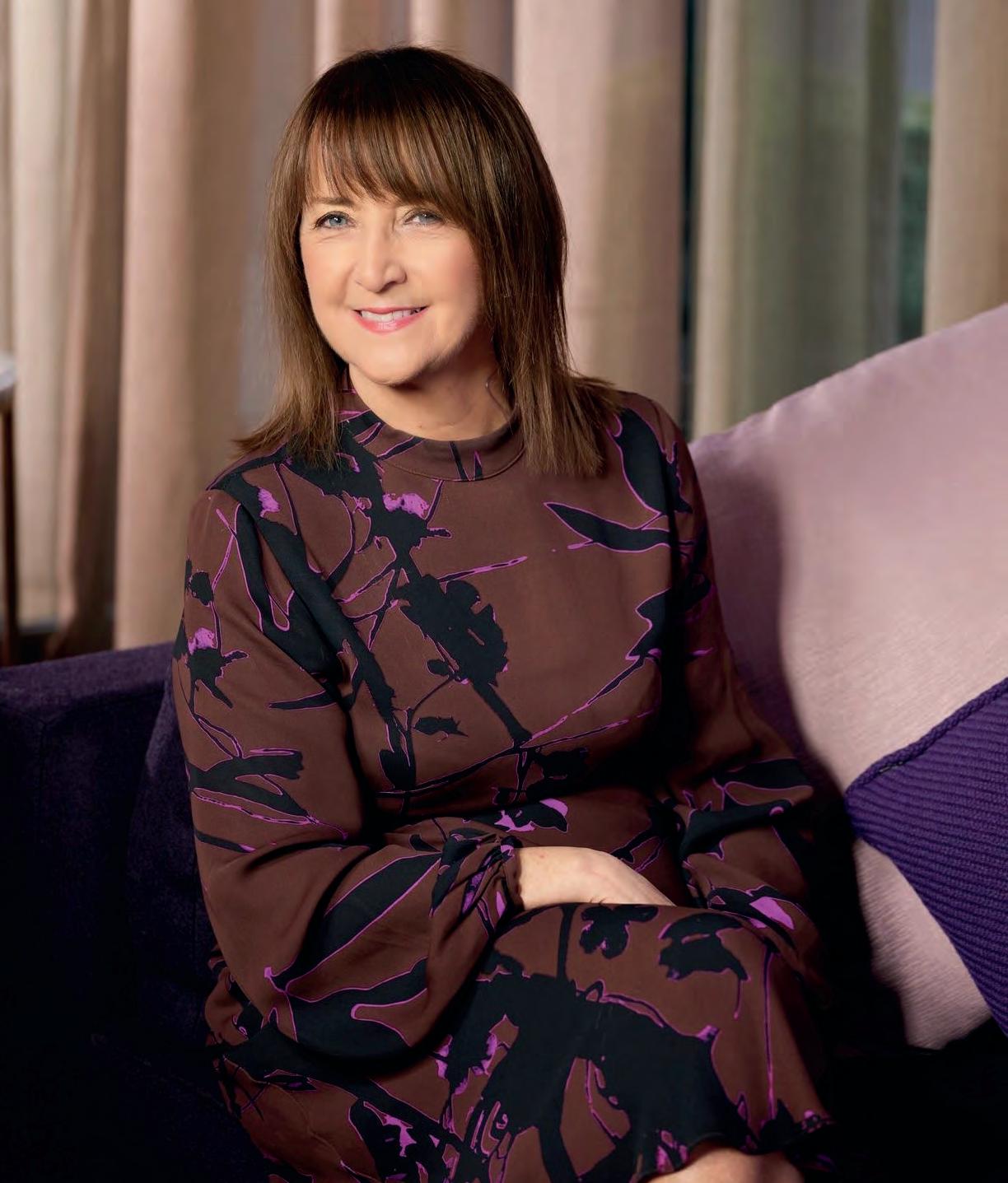
22 FEATURE
NI Chamber’s own Chief Executive Ann McGregor began 2023 with a personal announcement: 15 years after starting work with Northern Ireland Chamber of Commerce and Industry, the time had come to step down from the role. Following the announcement, Ambition sat down with her to discuss the highs and lows, her greatest achievements, some plans for the future and a few wise words of advice…
What was your education and career journey to NI Chamber?
I actually started out wanting to be a teacher, but when I got the offer of a place in Queen’s my family insisted I go, and so I found myself in Belfast at a time when there were only about 5,000 students at Queen’s and Belfast was a different city than it is now. My first full-time job was in Lurgan in a company called Warne Surgical Products, and from there I went to London where again I worked in a production company. Those jobs helped me to become a problem solver, to look at how processes could be improved and how people could work better together. Those skills and that attitude have stood by me to this day.
I came back to Northern Ireland really as a result of my husband’s career choices and at that time our two girls were very young. So, after a break of a few years I went back into the workforce at Dungannon Development Agency as a training manager. That led me into the whole world of enterprise, working with government departments, funding bodies and new business start-ups. It was a very exciting time for me personally and I learned how to talk my way into some offices, get doors open and I also quickly realised that if you take a chance, you will always learn something.
I started working with Enterprise Northern Ireland just as that body was formed, and bringing together all of the Local Enterprise Agencies from across Northern Ireland was a daunting task. But like everything, it all depends on the people around you. The success of Enterprise NI was based on building solid relationships, something I have come to regard as an art, rather than a science. I was with Enterprise NI for eight years before moving onto NI Chamber.
When you joined NI Chamber in 2008, it was in the midst of the global financial crisis. Was that a particular challenge?
Firstly, I was really delighted to be appointed as CEO in 2008: the first female to take the role in the 225-year history of the organisation. I wasn’t blind to the economic challenges and I think my experience working in business and economic development helped with that. So yes, the global and national economic challenges were very severe but when I first walked into the offices I found an excellent board of directors with an ambition to deliver for Northern Ireland and that set the tone for the next 15 years.
My first priorities were to get to know the team, the organisation, our members and the other business organisations and government representatives.
I also quickly realised the need to rebalance the representation of the business voice here. The importance and role of small businesses were not being amplified as much as that of inward investors and bigger companies and I wanted to reflect the prominence of the small business sector among our membership and across Northern Ireland. That did not mean that we should set aside or play down those other sectors but I wanted a voice for businesses of all sizes and from all sectors.
I also had to look internally at the operation of NI Chamber as a business. Every organisation – especially one with a history of more than 200 years – has challenges, peaks and troughs and I was determined to seek out the opportunities to build the team, improve the internal procedures, processes and structures to deliver our ambitious new strategy.
The team at NI Chamber is second to none. They are professional, committed and innovative. Whilst it has evolved over the years, we continue to attract fabulous people who are committed to the values of the organisation. Our reputation for customer service, quality and innovation can be directly attributed to the team.

What was the situation facing businesses in Northern Ireland in 2008?
Our members were facing immediate challenges around access to finance, the property crash and the emergence of the National Asset Management Agency (NAMA), high unemployment alongside skills shortages and at that time our economic decline was the steepest in the UK. The construction sector was in crisis and the housing market was at a low ebb. These challenges were being faced by a business sector which did not have a unified voice.
I felt it was important that businesses were connected to politicians and policy makers. Some of my first projects were organising ‘5 Leaders 5 Days’ which was a series putting party leaders in front of business leaders, hosting the first ever NAMA briefing to businesses on the island and connecting directly with Treasury.
23 FEATURE
That set the tone for my time at NI Chamber: connecting people, building networks, making good things happen.
When something like Brexit happens, with its huge implications, how did you respond? Was getting all the business organisations together on Brexit a challenge?
That whole period was very uncertain and fraught with emotion, both in the run up to the referendum and immediately afterwards. A lot of the views expressed were driven by the heart rather than the head and that was understandable; it was such a significant moment for the country. My role was to represent the views of businesses – some of whom had supported Brexit, some had not. So we dealt in facts, surveyed our members regularly and reported on the Brexit impact on the economy. I got used to holding my tongue when asked for a personal opinion on contentious political issues. To succeed in the role, I never forgot that I was there to amplify the voice of business.
But there was a Brexit impact and as political debate raged, it was up to business bodies to report on and reflect the views of businesses of all sizes and sectors. Working with my colleagues across other business bodies, I played a significant role in the NI Business Brexit working group and more recently, NI Chamber’s Stuart Anderson has led true co-ordination of activity and increased understanding of the practical challenges for all the sectors; that was an important and new development. NI Chamber has been a pivotal voice for our members in Brexit, the protocol and the current political stalemate at Stormont.
It is important too that while reacting to events around us, the team was also very proactive in designing new business support programmes. We focused on export assistance, on networking, on making good things happen by putting good people together under one roof. So, Brexit was a challenge but I think we faced it as well as we could do, and we did other good things at the same time.
Looking back, what were the key highlights of your time at the helm of NI Chamber?
The absolute number one achievement was to develop a brilliant team of people to lead the Chamber and to represent businesses in Northern Ireland and I am very proud of the work we have done.
I put in place a new strategic plan, a long-term vision which set out targets around membership numbers, turnover and output in terms of business development programmes. Over the last 15 years as our reputation and influence increased, we did attract new members, deliver new support programmes, increase our staff numbers, and that meant growing the Chamber. That was a management-led process, which all the senior team fully bought into.
How do you view relations between the private sector and local political parties?
Those relationships are now where they should be. It is a two way process where the business community respects the role and agency of the parties, and our elected representatives in turn take the views of business on board. We can and should always
be respectful of each other’s positions while being challenging, after all we are all looking for the same broad outcome – a shared prosperity and a successful, sustainable economy.
Does not having an Executive really hold back economic activity here?
The very short answer is: yes, it does. We are facing multiple challenges at the moment with rising costs, staff shortages, supply issues and global economic instability. A functioning Executive may not be able to address all those problems but even by existing, and working together, the politicians could help create conditions for economic growth and sustained investment. Without an Executive far too many big decisions are being left untaken – on infrastructure investment, planning reform, health transformation. Yes, we do need an Executive but we need one which really works. I hope that the conditions are now coming into place which will lead to the Assembly and Executive being reformed.
Are you optimistic for the future of the economy?
I am always optimistic! We have amazing resilience here that has been on display for as long as I have been working. Northern Ireland is already a leader in many sectors and the number of really exciting new businesses being established and growing gives me great hope that there is an economic future here for my children and grandchildren.
So, what comes next for you?
I do want to ease up a little bit. I look forward to not having to get up to the ringing of an alarm clock and always having somewhere to be or someone to meet. My husband Paul and I love living in Belfast, we love the arts, going to the theatre and enjoying the fantastic restaurants we have close to us, so we will be taking advantage of a bit more free time. But I have already joined a few charitable boards and I will enjoy that role and I think I have a lot to offer the private sector as well. I want to put my experience in production, change management and business strategy to good use, just in a less pressured environment. So, I am looking forward to the future and interested to see where it leads.
What word of advice will you have for your successor?
Take care of the team, that’s the number one. Let them do their jobs, grow their skills and recognise their expertise.
I would also say: enjoy the role. I have been fortunate enough to witness some really historic moments here and in GB and the USA. Leading NI Chamber gives you a front row seat at events and experiences at home and abroad and you know, there is great craic to be had as well!
I have also loved working with the various Chamber Presidents and board members. All of these senior business people give their time freely, they care about Northern Ireland and our economy and it has been a privilege to work with them and learn from them. Our members from across Northern Ireland and across all sectors are ambitious, innovative and creative and that spirit is infectious. It is a positive environment to work in.
24 FEATURE
WHAT THEY SAID A note of Thanks...
Throughout my career I have always placed a high value on being surrounded by talented, committed and energetic people. As Chief Executive of this amazing organisation, I have had the great fortune of working alongside a staff team, Board members, friends, mentors and business leaders from Northern Ireland and across the world who have inspired and sustained me immensely. I want to thank you all.
Without question, my proudest achievement has been developing a fantastic team. Throughout my time in this role, NI Chamber has attracted wonderful talent. I want to thank all of my colleagues for their support to me, and for helping to develop NI Chamber into what it is today.
It has been a privilege for me to work with an esteemed list of past presidents, each of whom gave of their time so freely and willingly. Thank you for your leadership, friendship and inspiration to me personally. The same goes to the many Board members who have served during my time and supported my ambitions for this organisation.
Over 15 years, I’ve had a ringside seat to watch many fantastic businesses flourish and grow. I want to thank those firms and the people behind them for providing the inspiration, for trusting me to represent you well and for your support for the work we do.
I am proud to leave NI Chamber at a time when its local and national reputation is at an all-time high. Our engagement with political leaders across the board is stronger than ever. The business voice is being heard clearly and I want to thank all of the political parties for their engagement. Local media have also played a central role in ensuring that the voice of NI Chamber has been heard when needed most – thank you to all those journalists who have shared the many chapters of NI Chamber’s story so far.
Finally, a very special mention to my family for your unwavering support. This has been the best job in the world and whilst I will miss it, I am so looking forward to spending more time with you.
Ann McGregor
Ann’s decision to step down as CEO was greeted by a flood of well-wishes, led by presidents past and present, as well as political leaders across the board.
“Over the last 15 years Ann McGregor, as Chief Executive of the NI Chamber of Commerce, has made a significant contribution to the regional economy and has been at the forefront in building and consolidating the critical relationship between business and government. Under her leadership, the Chamber has expanded and enhanced its range of business support initiatives, helping business and employment growth. Her strong record of delivery is a legacy which any leader would rightly be proud of. I have always very much enjoyed working with Ann and wish her the very best of luck for the future.”
Michelle O’Neill MLA, Vice President, Sinn Féin

“I am sorry to hear that Ann is leaving the Chamber for pastures new. It has been a pleasure to work with Ann during her years as Chief Executive and we have become good friends. She has been an excellent advocate and representative of business in Northern Ireland, bringing a highly knowledgeable, professional and courteous approach to all our dealings. Her insight into the challenges and opportunities facing the business sector and the needs of her members is superb and Ann can look back on many achievements during her time with the Chamber. I wish Ann continued success in all that she does.”
Rt Hon Sir Jeffrey Donaldson MP, Leader, DUP

“I am aware of the significant impact Ann has had not only on the Northern Ireland Chamber over the last 15 years but on the NI economy throughout her whole career, and I thank Ann for the tireless contribution she has made and will hopefully continue to make to its prosperity in the future.”
Chris Heaton-Harris MP, Secretary of State

“Ann McGregor has offered important leadership to the business community, in Northern Ireland and across the island, as it has navigated many significant challenges over the past 15 years. On behalf of the Irish Government, I would like to thank her for her dedicated work and her substantial contribution towards building a thriving Northern Ireland economy, helping to secure jobs and livelihoods and deliver prosperity for the island as a whole.”
Simon Coveney TD, Minister for Enterprise, Trade and Employment

25 FEATURE
“Ann’s leadership has been exceptional, especially during what have been very challenging times for the economy in Northern Ireland and indeed globally. The level of professionalism associated with NI Chamber is in no small way down to the talent and commitment of the senior management team under Ann’s leadership. We will miss her at NI Chamber and we wish her every success in her future roles.”
Gillian McAuley, NI Chamber President
“Whilst a truly formidable leader, Ann is also very humble, often understated, downplaying her relevance and significance in the development of the business community and indeed the NI economy. However, over the years, she has become a beacon for us all. Ann’s light shines most brightly as an exemplar and advocate for many of the wonderful female leaders that have followed her both in the Chamber and across the NI business network. I doubt that we will ever meet a better networker.”
Paul Murnaghan, Past President
“From my early days in the Northern Ireland Chamber of Commerce it was evident that Ann always put the Chamber and its members first. She was very supportive and helped make a difficult year, due to Covid, run efficiently as always.”
Ian Henry, Past President

“I have seen up close the impact of Ann McGregor on the economy of Northern Ireland. She is a formidable business leader in her own right, and has developed the NI Chamber to where it is today, viewed as the premier business organisation in Northern Ireland. Ann’s legacy will last well into the future, and we are all better because of her leadership.”
John Healy OBE, Past President

“Ann is one of the most driven CEOs I’ve worked with – NI Chamber has been transformed under her leadership. But what stands out most is her passion to help businesses grow and, in turn, drive the NI economy. She was a pleasure to work with and I wish her well in the next chapter of her career.”
 Elvena Graham OBE, Past President
Elvena Graham OBE, Past President
“Ann has transformed the Chamber into the most progressive and successful business organisation in NI. Her remarkable people and leadership skills are quite simply of the highest order and this is manifested in the development of NI Chamber over the years of Ann’s tenure. I am sure Ann will continue to contribute to the business community and NI as a whole.”
Nick Coburn CBE, Past President



“Ann is a fiercely dedicated and passionate supporter of, and representative for, the interests of Northern Irish businesses, regardless of whether they are one-person start-ups or major corporates. Her commitment to the members of NI Chamber, and to the communities in which they do business, is unquestioned. Ann is quite simply a truly inspirational person.”
 Francis Martin, CBE Past President
Francis Martin, CBE Past President
26 FEATURE
NI Chamber Chief’s UPDATE
Ann McGregor, Chief Executive, NI Chamber

Welcome New Members
Anchor Bar Complex
I’m delighted to begin this magazine’s update by welcoming more than 50 new members to our network, all of whom have joined us in recent weeks. Representing a really broad range of sectors, these firms are located right across Northern Ireland and are all ready to grow their businesses and networks through membership. Everyone at NI Chamber looks forward to getting to know you and your teams over the weeks to come.
It also gives me great pleasure to introduce our newest patron; executive search consultancy Narratology. Their support of our mission, and that of all our patron organisations is greatly appreciated. We thank Narratology for their support and look forward to working with Ruth and her team throughout the duration of the partnership.
It has been a month full of new introductions, not least with the appointment of two new board members, Cat McCusker, regional market leader at PwC Northern Ireland, and Fiacre O’Donnell, sustainability director at Vidrala. They will represent their respective industries very ably as we continue to support firms in all sectors across Northern Ireland.
Over the following pages, you’ll find a snapshot of some of the work we’ve been doing recently. As ever, over the next couple of months the team has planned a fabulous calendar of events and training, covering pertinent topics like supply chain sustainability, diversity & inclusion, as well as in cameras with the Department for the Economy and the Department of Finance. That’s in addition to training courses on topics including commodity codes and certificates of origin, as well as soft skills such as presentation training and a course designed specifically to help middle managers make the transition into leadership roles.
As always, we encourage you to make the most of your membership by getting involved in as much as possible.
Autism NI
Bassetts Bathrooms
Belfast Cleaning Company
Brand Triangle
CEMCOR
Click Corporate NI
Consentino
Corvus People
Enso Recruitment
Exitechdigital
Express Merchants
Fluent Format Ltd
Giraffe Associates
Hamilton Architects
Hidden Huntley
High Performance Networks
IFA
Innovation Workplace Solutions
International Business Centre
Ipsos
JMC Electrics
Johnston Financial
Kukri Sports
Loughview Leisure Group
Mallusk Enterprise
McAteer Solutions Ltd
NI Chauffeurs
NI Football League
NIFHA
Pentagon Solutions Ltd
Plan Energy Consulting
Progressive Fitness & Physiotherapy
RCK Partners
Revive Active
Roe Park Resort
Ross Boyd Limited
SGN Natural Gas
Só Sírecht
Solmatix Renewables
Story Box NI
The Smallpiece Trust
Time Keeper
TinyLife
Total New Members
Tourism Ireland
Ucsdesign
USEL (Growth Upgrade)
Woodmarque Joinery
* To become a member of NI Chamber join online at www.northernirelandchamber.com or phone the membership team on 028 9024 4113
27
NI Chamber Photo Gallery

1. Catherine Crilly (NI Chamber), Eamon Donnelly (Uform), Julie Skelly (Danske Bank) and Yvonne Byrne (PwC Northern Ireland).

2. Eamon Donnelly (Uform) spoke at a recent Grow with Danske Bank event.

3. Alan Bridle (Bank of Ireland), Maureen O’Reilly (Independent Economist and Member of the NI Fiscal Council), Kailash Chada (Phoenix Natural Gas) and Stuart Anderson (NI Chamber).


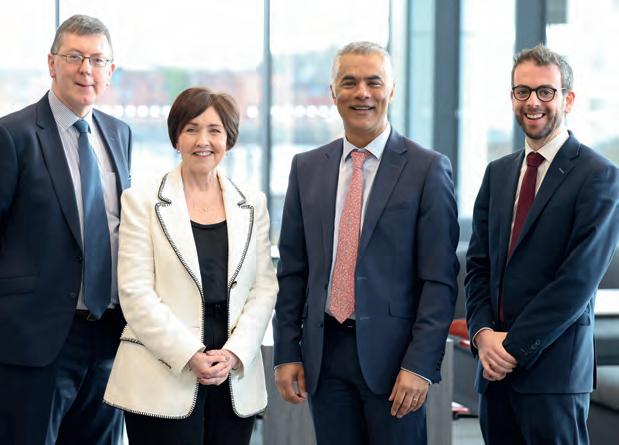
4. Delegates had the opportunity to network at the Public Affairs Forum.
5. Paul Murnaghan (BT), Mark Browne (Department of Education), Linsey Farrell (Department of Education) and Christopher Morrow (NI Chamber) at an In Camera event.
6. Stuart Anderson (NI Chamber), Kevin O’Neill (SONI), Zoe Crowe (Department for the Economy) and Paul Malcomson (Innovate UK).
28
EVENTS 01 02 03 04 05 06


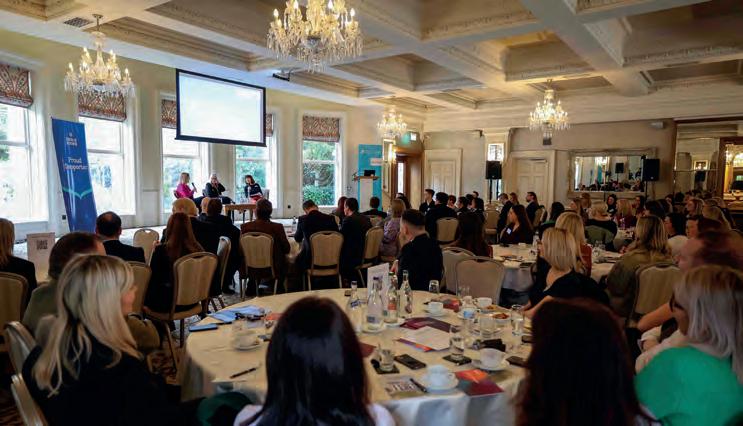



29
7. Stuart Anderson (NI Chamber) welcomed guests to the Energy Forum.
8. Ian McCann (Bank of Ireland) addressed attendees at the Business Breakfast Series.
9. Ruth Cunningham (Smarts) and Sinead Carville (FinTrU) participated in a panel discussion at a Business Breakfast event.
10. Aoife Hamilton (Employers for Childcare) speaking at a Future of Skills event.
11. Phil Murray (NI Chamber), Karen Smith (Disability Action NI), Paula Leathem (NIE Networks) and Aoife Hamilton (Employers for Childcare).
EVENTS 07 08 09 10 11 12
12. Mark Browne (Department of Education) addressed delegates at an In Camera event.
Regional Networking Series

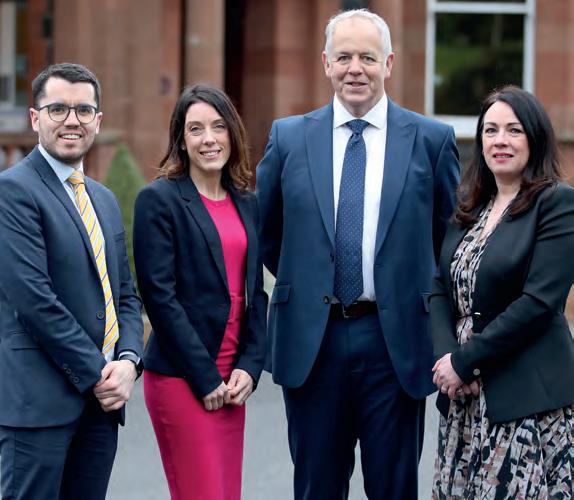




30
1. Attendees made new connections at NI Chamber’s recent Regional Networking event, in partnership with NIE Networks, at Cultra Manor.
2. Michael Kerr (RSK Ireland Ltd), Sean Conlon (TinyLife) and Nathan Tang (RSK Ireland Ltd).
3. Ian Hunter (NIE Networks) welcomed guests to the Regional Networking event.
4. Chloe Weir (Woodside Logistics Group) and Emma Leslie (Cosentino).
5. Jonathan Campbell (NI Chamber), Catherine McIntosh (therehuman), Ian Hunter (NIE Networks) and Caroline Coyle (NI Chamber).
EVENTS 01 02 04 05 06
6. Catherine McIntosh (therehuman) shared how to build resilience and mental toughness for wellbeing, performance and a competitive edge.
03
NI Chamber Welcomes New Board Members
Two senior business figures have been appointed to the board of NI Chamber. Cat McCusker, regional market leader at PwC Northern Ireland, and Fiacre O’Donnell, sustainability director at Encirc’s parent company Vidrala, join as the business organisation prepares to celebrate its 240th anniversary.
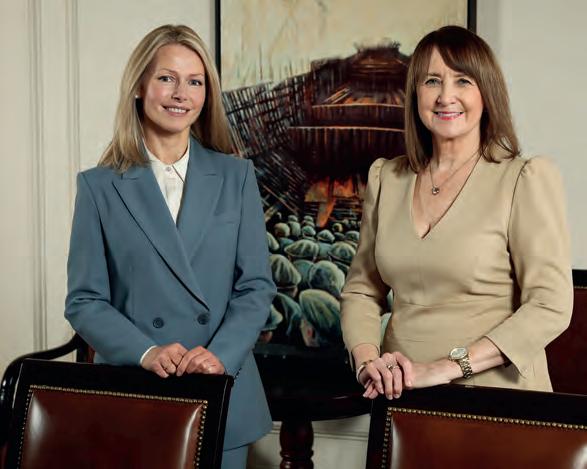
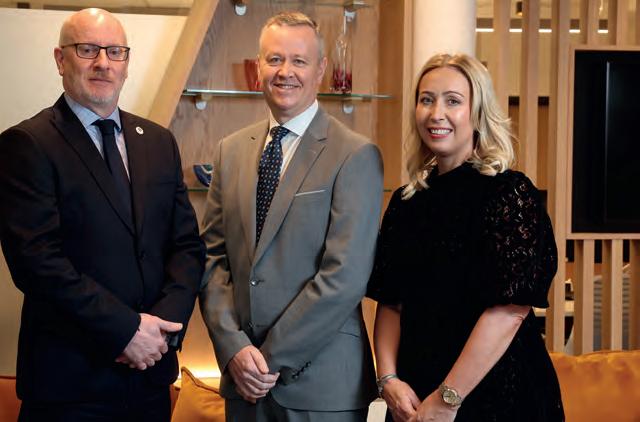
Cat McCusker is the regional market leader in Northern Ireland and the education consulting leader. The professional services firm employs over 3,700 people in Northern Ireland, which is PwC UK’s fastest-growing region. Its destination workplace in Belfast’s Merchant Square is PwC’s largest regional office outside of London. Cat is particularly passionate about the skills agenda, mental health, ESG and customer led transformation. Across her role as the education consulting leader, Cat works at a global and local level to help universities to reimagine their student and staff experience, bringing people, experience and technology innovation together to help solve some of the firm’s clients’ biggest challenges.
Fiacre joined Fermanagh-based market-leading glass container manufacturer Encirc in 1998. Each year, Encirc produces more than 4 billion glass containers for leading global brands, filling many of them for retail across the UK and Europe. Having held various roles in planning, sales, marketing and sustainability, he was appointed sustainability director of its Spanish-based parent company Vidrala in 2020.
Announcing their recent appointments, Ann McGregor, chief executive, NI Chamber said:
“We are delighted to welcome two people of such significant standing and experience to NI Chamber’s board. Cat and Fiacre bring a wealth of knowledge to our organisation and will represent their respective industries ably as we continue to support firms in all sectors across Northern Ireland. They join at the beginning of our 240th year, following in the footsteps of some of the region’s most eminent business leaders over centuries.”
Narratology Is New NI Chamber Patron
Narratology is the latest organisation to join NI Chamber’s group of patrons.
The headhunting firm works with companies across Northern Ireland and beyond to place key leaders in C-suite, functional director, senior management and board appointments. As a new NI Chamber patron, Narratology joins a select group of leading businesses who lend their support to the development of the region’s economy and business community.
Welcoming them, Ann McGregor, chief executive, NI Chamber, said:
“We are delighted to welcome Narratology as our newest patron. The company’s engagement at this level clearly demonstrates serious commitment to helping drive our economy forward and to supporting the business leaders who make it happen. We thank them for their support and look forward to working with Ruth and her team throughout the duration of the partnership.”
Ruth McDonald, managing director at Narratology, added:


“Narratology are proud to become a patron of the Northern Ireland Chamber of Commerce and Industry. We are passionate about finding the best leadership talent for Northern Irish companies and have a shared purpose with NI Chamber in championing the local economy and business community. We very much appreciate the support and guidance provided by NI Chamber and look forward to in turn supporting them through this partnership.”
Narratology joins a list of NI Chamber patrons which also includes: Agnew Leasing; Balcas; Caterpillar; Danske Bank; Eakin Healthcare; Encirc; fonaCAB; Moy Park; Pinsent Masons; Power NI; PwC; Queen’s University; Randox; Ulster Bank; Ulster Carpets; and Ulster University.



31 NEWS
Fiacre O’Donnell (sustainability director, Vidrala); Cathal Geoghegan (vice-president, NI Chamber); and Cat McCusker (regional market leader, PwC Northern Ireland).
Ruth McDonald, managing director, Narratology, and Ann McGregor, chief executive, NI Chamber.
A Morning With Michael O’Neill






32
1. Jonathan Campbell (NI Chamber), Mark Haslam (Loud Mouth Media), Claire McCollum (Event Host), Michael O’Neill (Irish FA), Paul Murnaghan (BT) and Petrina McAuley (NI Chamber).
2. Rachel Lyness (Cathedral Eye Clinic) and Joyce Shaw (Cathedral Eye Clinic).
3. Michael O’Neill (Irish FA) shared his unique leadership journey.
4. Peter Shepherd (Irish FA) and Kevin McVeigh (Elliott Duffy Garrett).
5. Claire McCollum (Event Host), Stephen Bogle (Irish FA), Michael O’Neill (Irish FA) and Christopher Morrow (NI Chamber).
EVENTS 01 02 04 05 06
6. Panelists discussed key themes including leadership styles, business growth, leading teams and culture.
03







Doyle Shipping Group (Belfast) Ltd 101 Airport Road West Belfast BT3 9ED Phone +44 (0) 28 90 755881 Email shipping@dsg.uk
More than ‘Just A Minute’
In an aim to remove barriers to employment, Power NI, part of Energia Group, and the NOW Group are working closely to facilitate specialised employment academies and provide training and skill development to support NOW participants’ entry into the workforce.
The energy company is encouraging participants to apply for roles in the company to aid their transition into working life and kickstart a meaningful, well-supported career. By providing work placements and site visits, NOW Group participants can get a clear picture of what it is like to work for Power NI including the environment that they would work in and the support that is available.
Alongside employment support, the partnership with the NOW Group serves as a direct pathway to collaboration on new projects and changes to Power NI’s processes. Through co-create workshops, the Power NI teams will avail of feedback and helpful direction from NOW Group participants on the usability of their platforms, bringing new ideas to life with those in mind right at the forefront of the projects.
Gwyneth Compston, CSR manager for Power NI, spoke about the partnership.
“As the leading energy provider, we know how important it is to make sure that we can accommodate for everyone who needs us. All our customers, employees and stakeholders should feel understood, while equally being able to understand what we do and offer, and we know that there are always ways to make this better. We’ve been working with the NOW Group for
quite some time and are so honoured to extend this partnership and have the expert support to provide better opportunities for those with autism and learning difficulties.”
The NOW Group, the organisation facilitating the JAM Card initiative in Northern Ireland, is a social enterprise that focuses on supporting people with learning difficulties and autism into jobs with a future. They began work with Power NI in 2019, providing JAM (Just A Minute) training to staff to recognise and support customers who may need more time or assistance. Power NI has continued this training and has been proudly extending the partnership into other branches of the business, the most notable being the employability opportunities and support.
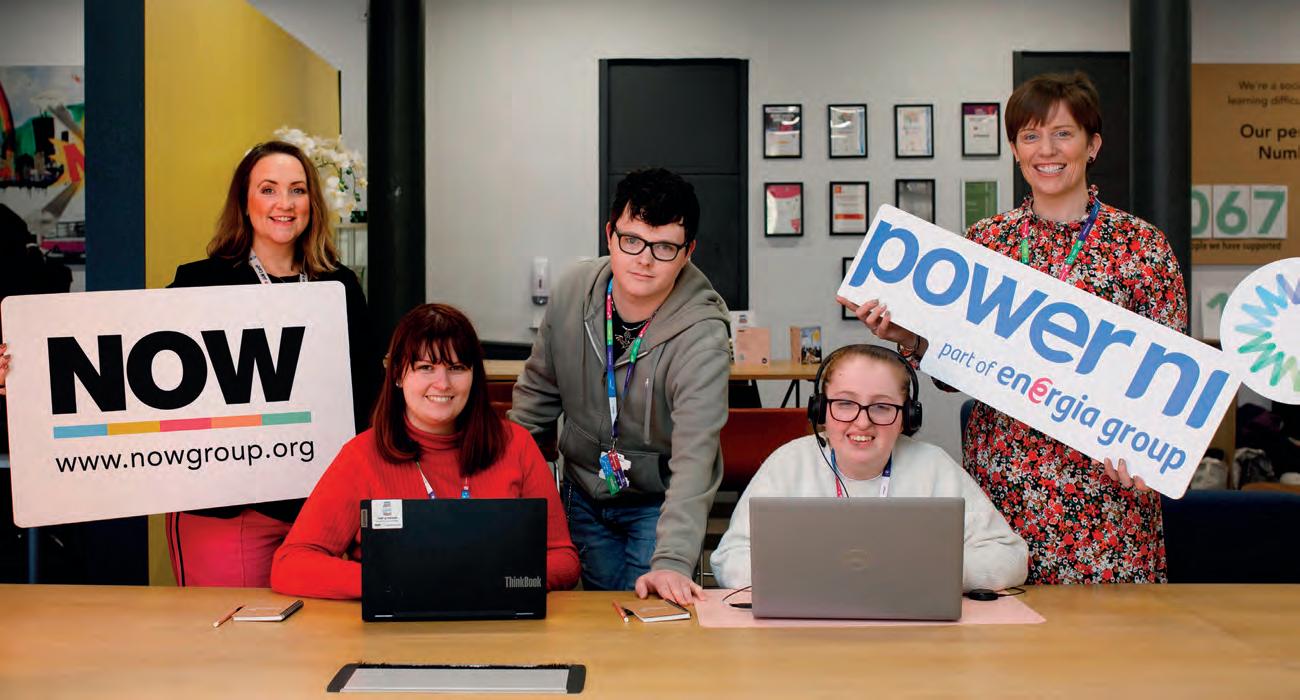
Nicola Tipping, business development manager of the NOW Group, explains:
‘‘We are delighted to have Power NI as a NOW Group Strategic Partner. Power NI is a fantastic supporter of NOW Group and the work we do to help people with autism and learning disabilities into careers with a future. From ordering food from Loaf Catering to becoming a JAM Card Partner they support all elements of our social enterprise.
Staff members have completed JAM Card training that enables them to provide excellent service to customers with learning and hidden disabilities. By completing this training, Power NI staff will have the confidence to support all customers to access the help they need in a simple and easy way.’’
34 FEATURE
Power NI is taking greater steps in its strategic partnership with the NOW Group to aid employment and provide tailored support for participants, and to provide better services, support, and opportunities for those with autism and learning difficulties.
Power NI and NOW Group proud to expand Strategic Partnership. Photographed (L-R) are: Nicola Tipping, business development manager of the NOW Group; Oonagh Reid, Connor McMurray and Aoife MacDermott, NOW Group participants; and Gwyneth Compston, Power NI CSR manager.












MAKE US YOUR FIRST CHOICE FOR RECRUITMENT We are a diversified staffing organisation dedicated to providing the highest quality staffing services with the greatest quality to our clients. We offer temporary, permanent and contract staffing solutions to a range of companies throughout Northern Ireland. COMMERCIAL INDUSTRIAL HEALTHCARE PROFESSIONAL First Choice Selection Services BELFAST LURGAN BALLYMENA NEWRY BANGOR ENNISKILLEN COLERAINE FOYLE 02890313693 info@first-choice-rec.com www.first-choice-rec.com
Belfast to Welcome Record
Number of Cruise Ships in 2023



Belfast can expect a record cruise season this year, as Cruise Belfast, the partnership between Belfast Harbour and Visit Belfast which markets the city as a leading cruise ship destination, has announced that a record 170 cruise ships are due to call in 2023.
As the cruise industry in Northern Ireland continues to provide a welcome boost to the economy, the number of ships expected this season represents a 20% increase on the previous record set in 2019.
NI Ranks #1 in the UK for Women in Work
Northern Ireland ranks top among the nations and regions in the UK for women’s employment outcomes, according to PwC’s latest Women in Work Index. The annual index of OECD countries found that Northern Ireland has moved up three places to the number one spot in the UK regional index. Northern Ireland also boasts the smallest gender pay gap (5% in NI versus 14.4% UK wide) and a higher female full-time employment rate than most. However, it has the lowest female labour force participation rate (70%) of all nations and regions in the UK (74.6% UK wide).
Software Alliance Launched

The Software Alliance was recently launched as the industryled, representative voice of the £1.7 billion software industry in Northern Ireland. Founding members of the alliance include Allstate NI, Civica NI, GCD Technologies, Instil Software, Liberty IT and Kainos. The group, which is chaired by John Healy OBE, seeks to identify and address the problems the industry faces, including labour shortages and skills issues.
Breakfast Series Serves Up Business Lessons
NI Chamber has launched a new calendar of breakfast events designed to inspire people working in a range of core business functions.


Now in its second year, The Business Breakfast Series in Partnership with Bank of Ireland is designed to provide managers in a range of business areas with the opportunity to learn from their peers and make new connections. This year, the series will focus on those working in HR and marketing teams, as well as anyone responsible for change management and leading on innovation.
The first event in February was about ‘Paying Attention to Retention’, specifically aimed at those working in HR, people management and employee engagement roles across any sector. Attendees heard from a panel of expert speakers including Ruth Cunningham, head of HR at PR and content agency Smarts, and Sinead Carville, chief administrative officer at FinTrU. The Business Breakfast Series in Partnership with Bank of Ireland is delivered as part of NI Chamber’s Learn Grow Excel Programme, which is supported by NI Chamber’s SME Partner Power NI.
Gilbert-Ash Hands Over Picture-Perfect National Portrait Gallery Redevelopment

Construction and fit-out company Gilbert-Ash has successfully completed the largest redevelopment of the National Portrait Gallery’s building since it opened in 1896.
The award-winning company was the main contractor on Inspiring People, a project comprising a significant refurbishment of the building, the creation of public spaces and a new Learning Centre, combined with a re-presentation of the collection, safeguarding the gallery’s heritage and creating an enhanced visitor experience. The final stage of Gilbert-Ash’s development will see the creation of a more welcoming visitor entrance and public forecourt, completed in time for the gallery’s reopening in June 2023.
Gilbert-Ash Managing Director, Ray Hutchinson, joined National Portrait Gallery’s Director, Nicholas Cullinan, at the handover ceremony.
Ray credited the company’s extensive experience in heritage and cultural projects as crucial to the success of the redevelopment. He said, “We are incredibly proud to have delivered the National Portrait Gallery redevelopment, which has been a true collaboration between our team, the gallery’s stakeholders, and our partners and suppliers.
“Together, we have delivered a world-class facility that respects and celebrates the history and heritage of the building, while also creating exciting new spaces for visitors to explore.
“Now that we have handed this project over, the gallery’s team will embark on the monumental task of redisplaying over 1,000 portraits from its collection. It has been a privilege to work on a project of this scale and significance, and we look forward to seeing the positive impact it will have on the cultural landscape of London.”
NEWS
36
Ann McGregor, Chief Executive, NI Chamber and Mark Cunningham, Head of Regional Business Centres, Business Banking NI.
Ray Hutchinson, Gilbert-Ash with Nicholas Cullinan, The National Portrait Gallery.












GivingTechnology Justice
The technological sophistication of legal firms is escalating at a speed like never before and Herbert Smith Freehills (HSF) is at the forefront of that movement, Belfast Managing Partner Lisa McLaughlin tells Emma Deighan.

There’s an unwarranted modesty around the HSF office in Belfast given the role it plays in the international law firm’s network.
Set up in Gasworks back in 2011, HSF Belfast was the first near-shore operation to be launched by an international law firm here but they won’t shout about that either, letting others assume that position.
It’s also, contrary to popular interpretation, not a back office for HSF, but rather a pioneer in legal tech and the go-to collaboration partner for many of the company’s international teams including the London, New York and Dubai offices.
“We started with 19 people, now we have 200 and it nestles around that figure,” Lisa begins.
“In the early days, we very much focused on disputes and document review for big disputes, whereas now the work we do is full service as you would expect a law firm to be and that tells its own story.”
From disputes to corporate, finance, real estate and employment, its service offering here is diverse while legal tech is its niche.
“We started taking big volume legal work that takes a lot of time, manpower and hours using tech. Our team was leading that technology and in 2015 we worked on the first predictive coding case. This technology saves a lot of human manual review but the human lawyer brain is still very much in control,” says Lisa.
38 FEATURE

39 FEATURE
Predictive coding, also known as technology-assisted review, has revolutionised how legal firms work, but it is a little-known fact that HSF was one of the leaders in that domain.
“Within the first couple of months of Belfast being opened, we moved from working with just London to New York and Hong Kong. The pleasing thing for me is there was a real recognition within the firm that our team were brilliant, really clever and great lawyers. Belfast literally became the go-to and something of an incubator for new things and we’ve embraced that.
“Today the tech has become even cleverer,” Lisa continues.
Beyond lawyers, the ALT (alternative legal services) team in Belfast is made up of legal analysts and eDiscovery specialists; all working closely with their counterparts across ALT’s global network to provide a seamless, round-the-clock service to clients.
“We’ve never been a back office, ever, because the work we were doing here was work I was doing when I worked for the firm in London, it was and is really integral to what we do for our clients,” Lisa says.
Reiterating the Belfast office’s humility, Lisa adds that, when HSF was recruiting in 2011, she prepared new recruits for a typical office-based setup “but within a year we were also seconding people to Qatar and Australia.
“I think we started out with modest expectations and the team we have now is working with big clients every day, many of which are FTSE 100 clients, global and international clients.
“We were initially measured in the expectations we set with candidates, too. We never thought in our wildest dreams we would grow to a team of 50, never mind what we are now. That evolution has been client-driven,” she adds.
The appetite from clients for legal tech has been a huge contributor to the growth at HSF Belfast.
According to the most recent Future Ready Lawyer Survey by Wolters Kluwer, law firms that most effectively leverage technology thrive.
It reads: “Year after year, they outperform other organisations across several important metrics and demonstrate why investing in and applying the right technology matters.”
It adds that 63% of technologyleading law firms report their profitability increased over the past year – more than any other firms.
Further testament to this is Lisa’s listing in The Lawyer Hot 100 list for 2023, a ranking she attracted for her contribution to HSF, including growth and opportunities for legal and business graduates.
“That Hot 100 listing is amazing, but as I said to my team, it names me as the office managing partner but I think it’s an award for all of us. Yes, we’ve had significant year-on-year growth but I think it was as much about the acceleration of the business.
“We have a great platform and the next 10 years are going to be more exciting, partly because of the type of place this is, our focus on culture – making us a place where people could come, be authentic.”
Globally the firm is ranked high. It was the only law firm or provider of alternative legal services in the world to be recognised in all four categories of the 2022 Chambers Alternative Legal Service Providers Guide. The firm was ranked Band 1 in Litigation Services, Band 2 in
Contract Lifecycle Management, Band 2 in Law Firm LPO and Band 3 in Flexible Legal Staffing.
It was also the second consecutive year that HSF has been the only firm listed in all four categories of the guide.
Lisa’s ranking is as impressive as her background is illustrious.
She graduated from Queen’s University Belfast, after which she lived in London as a trainee solicitor eventually qualifying as an international arbitration lawyer.
She also worked as a judicial assistant at the Court of Appeals sitting in Lord Chief Justice Paul Kennedy’s office in what she describes as the “most amazing experience ever” and full of “real pinch me moments”.
She has been part of HSF for two decades, half of which was spent in London when she was given the opportunity to return home and co-lead the Belfast office alongside now-global Managing Partner for ALT, Libby Jackson.
Looking ahead she predicts a faster evolution of legal tech, which the Belfast office hopes to be at the forefront of.
“We’re so expert in tech and digital and there are huge digital transformations and clients are demanding that. That will only continue growing and getting more exciting,” she adds.
“All our teams are busy, our corporate team is seeing a lot of growth and they have a very busy year or two coming up.
“I see the biggest opportunities for us being the continuation of evolution. We’re not resting on laurels and digital legal tech will be the big focus.”
Lisa says the firm’s relationship with NI universities will also be a focus: “There’s a job to do to make sure the skills match the opportunities because challenge-wise I would not be the only business leader saying I could employ an extra 20-30 people right now, but the skills shortage in some of the roles we have is a bit concerning. There are huge opportunities for new roles, but challenges if there isn’t enough of that talent to go around.
“Everyone in our team has a legal tech mind and the digital possibilities will be huge in the next five years. I don’t know where that will take us, it will mean that what is already a diverse set of roles will get broader, which is really exciting for Northern Ireland and Belfast.”
40 FEATURE
“We were initially measured in the expectations we set with candidates, too. We never thought in our wildest dreams we would grow to a team of 50, never mind what we are now. That evolution has been clientdriven...”
Professional Services that build diverse and inclusive work places are thriving























































At Diversity Mark, we support professional services firms helping them to create diverse and inclusive businesses that brilliant people aspire to work for.







































































































Receiving the Diversity Mark Accreditation demonstrates your commitment to creating an inclusive & diverse workplace where all employees can feel valued, safe and respected.




Diversity Mark
It’s time to commit to Progress Gain accreditation with Diversity Mark and demonstrate your commitment to diversity and inclusion in your workplace. Visit diversity-mark-ni.co.uk to get started.
An Attractive Option for Holidaymakers
Numbers show Northern Ireland is now an attractive option for Republic of Ireland holidaymakers, writes Ellvena Graham, Chair of Tourism Northern Ireland.

42 FEATURE
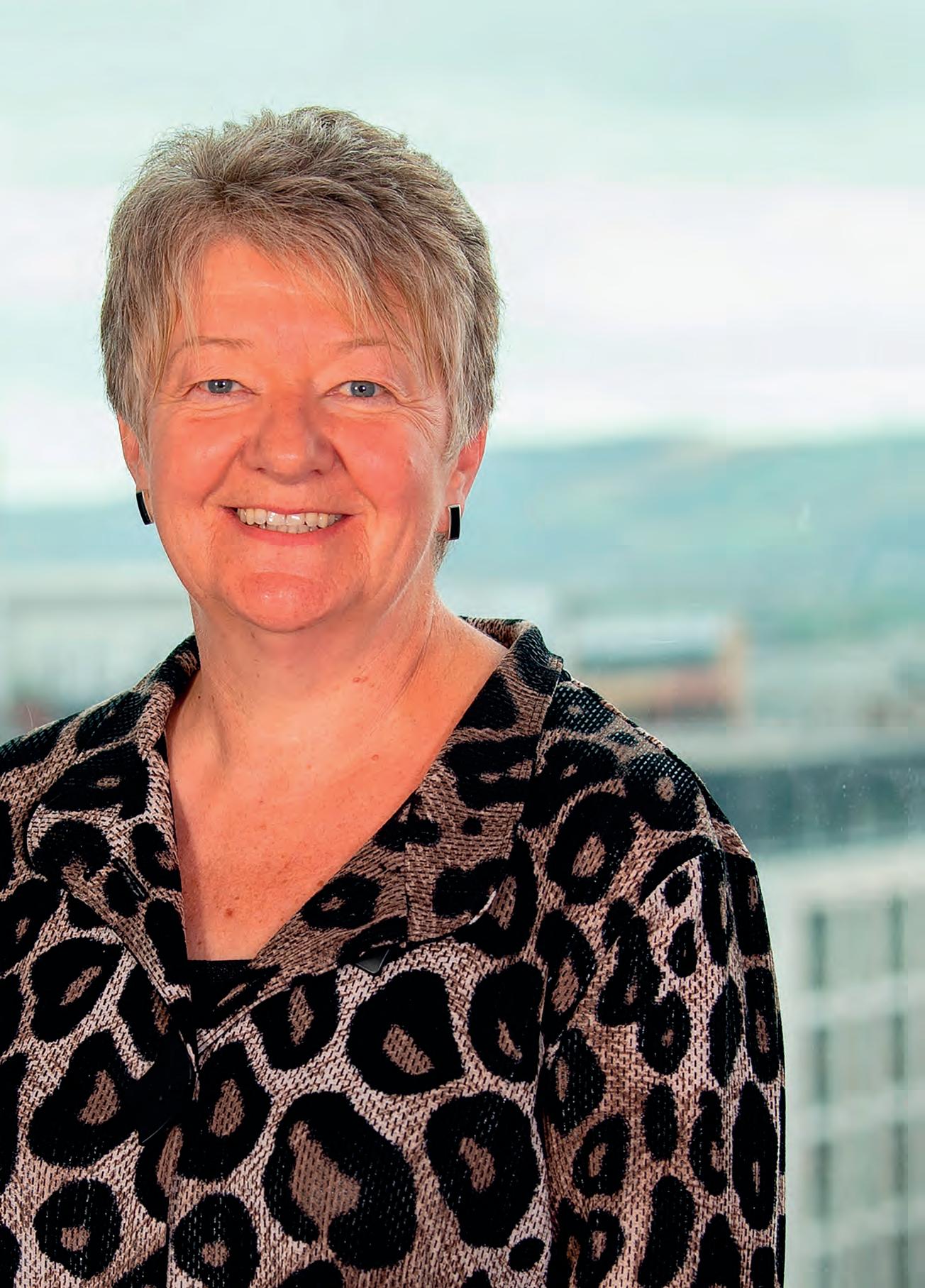
43 FEATURE
Ellvena Graham Chair, Tourism Northern Ireland.
Arecent survey series from the Irish Times and ARINS, and a separate Ipsos poll, have led to much conjecture in the wider media about current challenges and opportunities for cross border relations.
Given the sample size of the poll one would expect a high degree of statistical accuracy and indeed, the findings correlate with Tourism NI’s own analysis.
It is, however, a snapshot in time. What is also informative is how that picture has changed over time and the factors that have impacted those trends.
Historically, Northern Ireland residents have been much more willing to travel south. Undoubtedly decades of civil unrest were a major factor and a lack of investment in tourism infrastructure north of the border resulted in the Republic being a more appealing proposition as a holiday or short break location.
That picture changed, however, between 2010 and 2014 with the opening of Titanic Belfast and the new Giant’s Causeway Visitor Centre and great events such as the MTV European Music Awards, Derry’s year as UK City of Culture and the Giro d’Italia.
Despite this investment, however, the increase in cross border tourism traffic was marginal. In 2015 Republic of Ireland overnight visitors spent £60.9m. On a per head of population basis, Northern Ireland residents were spending around ten times more in the South than Republic of Ireland residents spent in the North.
In the same year Tourism NI’s board set up an independent taskforce to explore the reasons for the slow growth. The taskforce was chaired by the late Eamonn McKeon, former CEO of the Irish Tourism Industry Confederation, and included a number of people with an in-depth knowledge of both the tourism sector and the psyche of the Irish consumer.
The findings of the research undertaken by the taskforce were stark and included limited knowledge in the South of the geography of Northern Ireland, or indeed the Border Counties, misperceptions of Northern Ireland’s distance, and a lack of awareness of things to do or places to eat out.
With the very odd exception, Northern Ireland’s hotels and visitor attractions did no marketing in the Republic at all and so were rather invisible to Irish consumers.
Since 2016 Tourism NI, working closely with the local tourism industry
in Northern Ireland, has embarked on a highly focused marketing strategy aimed at changing the perception of Northern Ireland with the Irish consumer, targeting those people most open to persuasion to travel north.

In what was a record year of tourism in 2019, the year The Open was staged at Royal Portrush, visitor numbers from the Republic had increased to 756,000, a 125% increase from 2015.
During the pandemic we also witnessed a visible increase in the numbers of Republic of Ireland number plates on our roads and in our car parks. In the absence of reliable statistics, it is difficult to assess market performance in those years. But we do know that many people holidayed at home due to travel restrictions and
safety concerns and became much more familiar with what is on their own doorstep.
Tourism NI’s latest consumer sentiment research indicates that around half of Republic of Ireland residents who took a holiday or short break in Northern Ireland in 2022 were first time leisure visitors.
The most recent statistics for 2022, a year which has seen a return to something close to normality, were recently released by the Irish Central Statistics Office. These show that just over 800,000 visitors from the Republic of Ireland spent almost 2 million nights in the North, spending £164m here in the first 9 months of 2022. That was 68% higher than during the same period in what was a record year in 2019.
In Jan-Sep 2015, figures show that 226,000 Irish residents made an overnight trip north of the border. In the first nine months of 2022 that had risen to 809,000.
The likelihood is that end of year statistics for 2022 will show that visitor numbers from the Republic will have trebled since 2015. The underlying trend is therefore one of dynamic growth.
During the pandemic, Republic of Ireland visitors helped breathe life back into our city centres, towns and villages. They also brought much needed business to hard pressed restaurants, bars and retail stores across every part of the country as well as to hotels and visitor attractions.
What the Irish Times/ARINS survey does show is that there is still much room for growth and many more neighbours from the Republic of Ireland that we can look forward to welcoming in the future.
This article first appeared in the Irish Times.
44 FEATURE
“During the pandemic, Republic of Ireland visitors helped breathe life back into our city centres, towns and villages. They also brought much needed business to hard pressed restaurants, bars and retail stores across every part of the country as well as to hotels and visitor attractions.”










45 SCAN HERE

46 FEATURE
Fit for the Future
Antrim-based fit-out firm Mivan recently announced a record order intake of £100m. CEO John Cunningham tells Emma Deighan why the firm is in demand and the future of its ascent.

“You will be hard-pressed to find a fit-out contractor with the global portfolio of Mivan. We attribute our success to our people – their skill sets, their knowledge and their loyalty. There are not many companies that offer the full turnkey package we provide, along with the quality product we deliver,” John Cunningham, CEO of Mivan, begins.
His words are brought to life by the striking images of the company’s timeline of work; from the ornate interior of The Bulgari Hotel and Residences in London to the luxurious transformation of all 10 Grand Hibernian train carriages and the timelessly stylish One Hyde Park residential development in the heart of Knightsbridge.
They’re all scenes of interior utopia.
But that is the firm’s USP. It is a provider of prime and super prime fitouts with a portfolio that spans the world on land and sea. Its client portfolio is a list of who’s who at the top of the hospitality and residential sectors.
Mivan’s portfolio illustrates joinery at its finest with luxe materials that many can only dream of even imitating.
The company’s main area of work is in the hospitality and residential sectors, with offices and retail also featuring. Historically it has completed many national museums, which is a sector it would like to return to. Meanwhile, its cruise line and superyacht fit-out clients are starting to return following the impacts of COVID.
Business, John says, is 70% land-based and 30% marine-based. “Super prime hotels and super prime residential developments are the bulk of our work although sector diversification is a strategic focus within the business where we stress the importance of not having all our eggs in one basket,” he continues.
“That was evident when the pandemic hit. The marine and superyacht division was heavily impacted but thankfully we had the resilience of our land sector projects to maintain revenue for the business. Although super prime hotels and super prime residential developments are currently the sectors demanding our services most, we recognise markets will change
47 FEATURE
and with a portfolio of delivering within marine, super yachts, offices, sports stadiums and museums we are well placed to move with the market.”
John says the company’s recent strong performance can be attributed to such strategies and says turnover for 2023 is now set to be circa £70m.
The business is also on target with that strategic growth plan to increase turnover to £100m by 2025, while 100 new jobs have recently been announced to support its continued expansion and the next phase of a multi-million-pound capital investment programme is also underway.
John adds: “Recruitment has been ongoing since September 2022 and has increased further in the last month. A number of key London positions were filled but we still have more to fill. Recruitment for the factory has been steady and we are confident in filling all roles required by April 2023.”
That process won’t be without resistance from the talent deficit facing all sectors, with technical roles including project management and commercial management a more notable challenge to fill.
John adheres to the Chinese proverb ‘The best time to plant a tree was 20 years ago. The second best time is now’, when approaching the subject of skill shortages.
“We had a recruitment open day and that has helped us get a lot of people through the door and we need to go further. We have a core number of joiners in the factory and the open day did help.
“This skills shortage that was present in almost every industry pre-COVID is still a threat to organisational growth everywhere and having a strong talent pipeline is more crucial than ever. However, when recruiting, it’s not about the number of people we can attract, it’s about the quality of the candidates.
He says the firm will ramp up its strategy to ensure a healthy pipeline of workers. This includes “attracting the right talent, reviewing our application process, building our construction talent pipeline and investing in our people by promoting and training within. An apprentice scheme, navigate programme and attractive packages will also support this.”
There will be 300 Mivan employees at the end of the recruitment process.
Geographically, the majority of Mivan’s high-end projects are London-based but they are not confined to the capital.
“As a business, we have a track record of working on a global stage. Geographic location is not an obstacle to the business. We are strategic in targeting projects and clients that suit our offering. Although we envisage London will be our main revenue stream we are currently targeting projects in the north of England and Scotland as well as the Middle East,” John adds.
It would also like to have a more prominent presence in Northern Ireland’s interior landscape. It currently has one live project here with another due to commence.
“We want to be doing more in Ireland and we are currently undertaking a project in the heart of Belfast City centre as principal contractor for the Pearl Assurance Building, plus a significant residential development on a piece of prime land in Newry.”
The Pearl Assurance job is a multi-millionpound contract scheduled for completion this summer. Mivan will be responsible for the restoration of the historic façade,
the creation of ground-floor retail units, open-plan offices, a roof terrace and a rear extension, as well as internal finishes and specialist joinery.
Its other live work this year includes a high-specification fit-out project worth in excess of £17m for Multiplex for One Nine Elms and a new five-star hotel in London, due for completion by the end of 2023.
There are also fit-out projects worth more than £8m for Prime Development and Sir Robert McAlpine for the Peninsula Hotel on Grosvenor Place in London while a multi-million-pound contract for a fivestar hotel in Mayfair also features.
Exclusive private residences at Chelsea Barracks will also be completed at the end of 2023 by Mivan.
Off-land new projects include a £2.5m interior fit-out of a 34-metre superyacht at Pendennis Shipyard in Falmouth. Looking ahead John anticipates the industry to favour smarter more sustainable solutions.
He explains: “Sustainability is at the forefront of our priorities and mentioned a lot in tenders. We can trace all the timber we use, we’ve got that within our business here. In relation to trends, there is a lot of demand for high-end timber, timber veneers, stone and marble in the prime and super-prime sectors.
“Modularisation – which we do in the factory – click and play, that type of thing will become more common,” he says.
“We have invested heavily in digital construction technology and 3D modelling to enhance client engagement and collaboration in the design process, streamline manufacturing, and facilitate site installation.”
At its 110,000 sq ft factory in Antrim, Mivan has recently invested £1m, which includes the addition of a new online dryer for its automatic spraying equipment and a six-metre five-axis CNC machine, which will be installed by spring 2023 to further improve capacity and efficiency.
“Not everyone can do what we do and that’s part of our reputation. The market isn’t full of people like ourselves and there is no doubt we are targeted by clients and contractors. I’m not saying we’re the only ones, but we’re certainly a Northern Ireland-based company that is very much sought after.”
48 FEATURE
“As a business, we have a track record of working on a global stage. Geographic location is not an obstacle to the business. We are strategic in targeting projects and clients that suit our offering.”
Translink - Better. Connected - Decarbonising Transport in Northern Ireland


Climate change is one of the greatest challenges facing our society, and Translink is leading the transport transformation, aiming to reduce our greenhouse gas emissions by 50% by 2030 and operate a wholly Net Zero emissions bus and rail fleet by 2040.
This is vital to tackle the climate emergency and drive change for a better quality of life for future generations, as well as deliver greener, healthier outcomes.
Transport is the second biggest emitter of Green House Gases in Northern Ireland and Translink is embracing Zero Emission technologies and innovations, both battery electric and hydrogen, to decarbonise public transport. With the transition well underway in Belfast, Derry~Londonderry will see the Foyle Metro fleet transition to battery electric Net Zero vehicles by the end of 2023, with an initial roll-out of battery electric Net Zero vehicles on Ulsterbus services in the Causeway Coast area during 2023 also.
The Need for Change
Transport is responsible for 20% of Northern Ireland’s total greenhouse gas emissions, which represents an increase of 22% since 1990; by far the biggest contributor is the private car, and it is notable that the number of registered private cars in our community continues to grow. Transport, again, mainly the private car, consumes 30% of Northern Ireland’s total energy on an annual basis. This brings significant impacts on all aspects of society, from congestion in our town and city centres and delays to commutes and essential journeys to negative effects on air quality, which in turn impacts on public health; some recent research indicates that approximately 800 deaths a year in Northern Ireland are as a result of poor air quality.
Public transport, as part of a general modal shift towards more sustainable travel, is the means to combat these negative impacts on society. An effective, efficient, appropriately funded public transport service can help drive connectivity in our economy, in employment, healthcare, education and in social and leisure opportunities. Such a transition will also support ongoing emissions targets and drive a
shift from fossil fuels to renewable transport energy, as well as supporting collaboration across sectors and create a range of green jobs.
Translink is at the forefront of Northern Ireland’s drive towards a Zero Emission future, and we are pursuing a radical agenda to transform transport here, making bus and rail journeys everyone’s first choice for travel, today for tomorrow.
story of 2023 will be the roll-out of a fully battery electric fleet for Derry~Londonderry’s Foyle Metro network, which is on track to be delivered this summer, alongside an initial rollout of Zero Emission Ulsterbus vehicles based at Coleraine, ahead of planned future roll-outs.


As well as major investment in fleet, this ongoing transition to Net Zero also involved a significant focus on infrastructure and training. We already operate one of Europe’s largest hydrogen refuelling plants at our Milewater complex in north Belfast, and have delivered significant charging infrastructure at our various Metro depots in Belfast and at Pennyburn in Derry~Londonderry.
Zero Emission also focuses on futureproofing our railway network; we are working with Irish Rail and other stakeholders to deliver new fleet for our Enterprise service, thus providing a significant increase in Enterprise frequency and capacity, and helping to drive economic growth and cut emissions on the vital Belfast-Dublin corridor. We are planning our transition towards Zero Emission trains and are preparing for future electrification. We also await the publication of the highly anticipated All-Island Strategic Rail Review, which is expected to recommend expansion and enhancement of the existing railway network.
Conclusions
In taking action against climate change, we are also taking steps to assess, plan, design, build and upgrade our infrastructure to ensure we can operate in a way that anticipates, prepares for and adapts to changing climate conditions, including flooding and high temperatures. These actions will ensure that our infrastructure can withstand, respond to and recover rapidly from disruptions caused by climactic conditions.
Translink is already playing a full part in Northern Ireland’s transition to Net Zero, but we have more to do in the years ahead. It is vital that an appropriate level of support is delivered for public transport here in order to address a long-standing legacy of underfunding in our network, helping to develop a better, more connected, Northern Ireland that can fulfil its economic, social and environmental potential.
We are embracing Zero Emission technologies across our bus fleet – we introduced our initial hydrogen-powered buses on Belfast Metro services in 2020, with the addition of another 20, alongside 80 battery electric buses, last spring. Further Zero Emission enhancements are planned for Metro this year and next, although the major
Find out more at www.translink.co.uk/betterconnected
Disrupting the Norm


PwC is on a mission to equip the next generation for a future of STEM jobs, some of which have yet to be created. Cat McCusker, regional market leader, talks about the firm’s “disruptive” initiatives that would go some way to addressing the skills deficit in Northern Ireland.

50
FEATURE
At PwC NI there are almost 4,000 sta , making it the largest UK o ce outside of the professional services firm’s two London flagship sites.
A significant proportion of that team is made up of talent sourced from our two universities, where PwC has technology and business management degree programmes.
It is also composed of personnel sourced via the firm’s relationship with colleges here.
In fact, sourcing locally is a theme at PwC and it’s a theme that has ballooned to not only create opportunities for school leavers and graduates but to safeguard the flow of talent for the future.

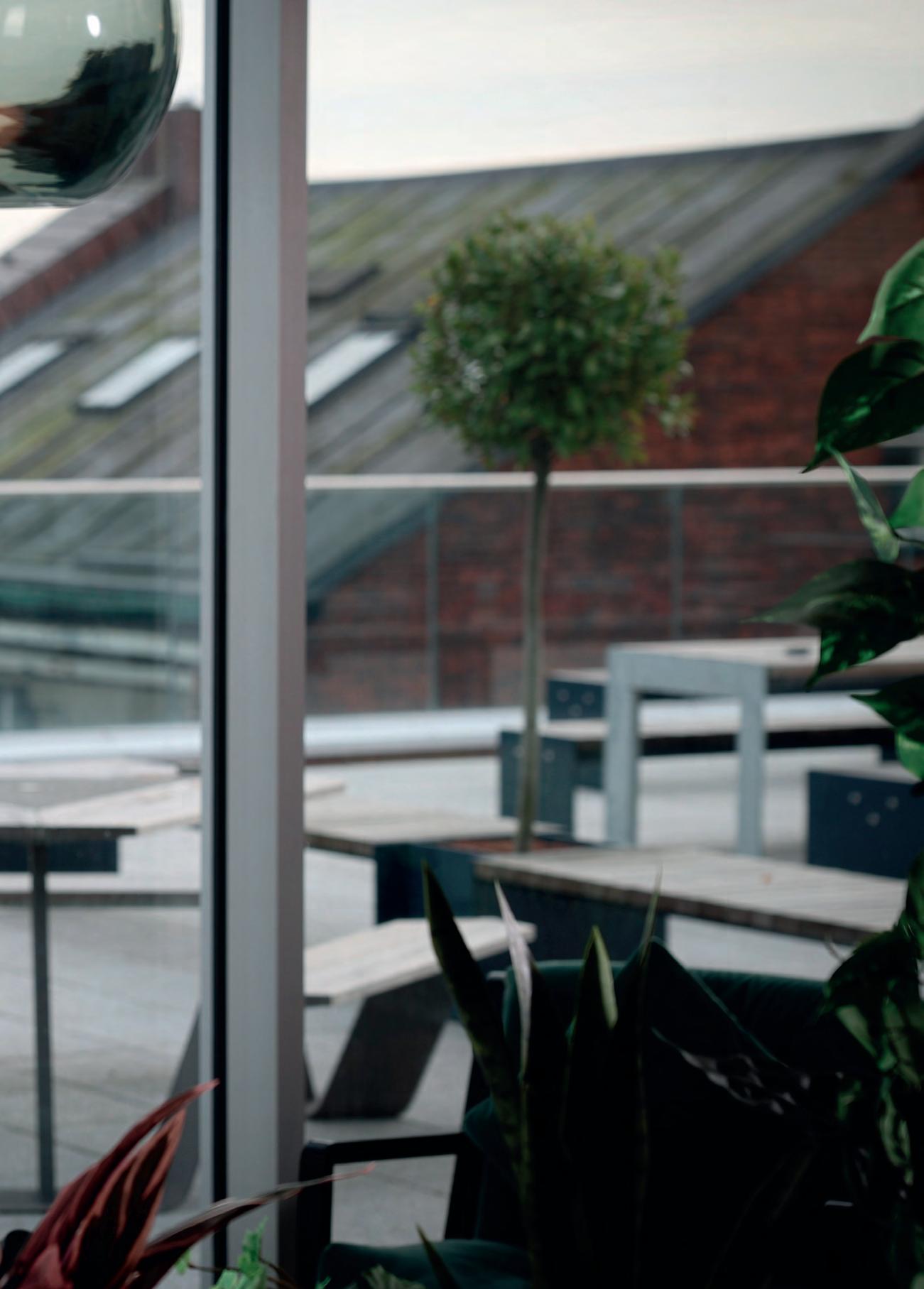
One of PwC’s biggest social priorities is to inform and nurture upcoming talent so jobs of the future aren’t confronted with alarming scarcity and the next generation feels empowered by having the right skills that will set them up for success.


Cat McCusker, regional market leader and education consulting leader, is spearheading that movement here and disruption is at the root of all solutions, she tells Ambition Magazine.
“We have to change the dial. We have to disrupt and we have unique opportunities in Northern Ireland because of our size to change how things are done, really look at the outcomes we want to achieve and make significant societal impacts – because if we can’t then who can?” she asks.
Illustrating some of the skills challenges Northern Ireland may encounter in coming years was the company’s recent Green Jobs Barometer. It showed that NI has one of the lowest proportions of green jobs which creates concerns given the anticipated growth needed for NI to reach net zero targets and the demand for green jobs (four in 10 are interested in working in the green sector).
It also shows the work that needs to be done to accommodate those posts while not squeezing talent in other sectors.
“We have a real opportunity to lead the UK,” Cat continues. “We have always
51 FEATURE
been strong in terms of education, we can showcase how to do it but it won’t be without disruption and the public and private sectors coming together.”
Historically PwC has been at the forefront of promoting careers of the future by collaborating with the public sector. Most notable is its work with the Department for the Economy on its Assured Skills Academies which can fast track graduates into professional services roles. This year marked its 23rd Skills Academy.
It has also recently celebrated the fifth anniversary of its Technology Degree Apprenticeship Programme with Queen’s University Belfast (QUB). It combines studies and work experience and offers students a full salary and fully funded tuition fees.
That degree is just one of a handful of other similar programmes offered here via Ulster University and QUB.
“We know that with advancements in tech, there is a mismatch between the knowledge an employer needs to meet business objectives and the supply of tech talent. Our tech degree apprenticeships are about taking action to make this happen. They build on a number of steps we’ve taken including offering paid internships, extending our schools outreach and working to increase the number of people in technology roles from all backgrounds,” says Cat.
To broaden its talent pool, the firm has also dropped its 2.1 criteria for its graduate intake to a 2.2 in a move designed to “open up opportunities to more people, increase the socio-economic diversity of the firm and support its efforts to improve social mobility”.
“How we consume education and training has changed so much from what it was 20, even 10 years ago and a lot of people with a 2.2 can bring a different diversity and dexterity to the role.
“The people who are the most progressive and successful in the world of AI for example are sometimes elite gamers.
“You can look at personality traits through different forms of assessment to know what capabilities people have and how to work with them in a different way. It’s about how we use people’s skills
and their passion that generates the best outcome.
“Take influencers for example and how they operate as a business. We need to embrace those people and those skills, that mindset, and it’s no longer about being perfect,” continues Cat.
She says lowering the degree level is also opening up access to 70,000 more graduates from outside its usual university pools allowing it to be “truly disruptive”.
More importantly, it is hoped the shift will help bring back some of the student export market, those students who have left here to study in England or in the South but have yet to return.
Investing in skills is one part of PwC’s New Equation — a future of a human-led, tech-powered community of solvers. That strategy aims to “address the breadth and complexity of challenges facing businesses and society”.
More evidence of this New Equation is PwC NI’s £40m investment into an Advanced Research and Engineering Centre in Northern Ireland in 2021 — a move that is creating 771 tech and operational jobs over the next five years.
It did this with the support of Invest NI and in sync with the 10X Economy strategy.
The firm is also exploring options for developing maths skills in NI, particularly for pupils of GCSE level who show an aptitude for STEM subjects.
Cat says Northern Ireland is at risk of a shortage in STEM skills — physics talent in particular — with just a handful of opportunities in that area at our grammar schools.
“We really have to address this. It’s important that we find ways to improve these vital STEM skills in our people so that NI can remain a top destination for skills, careers and foreign direct investment.”
Beyond those hefty investments in training to skill the workers of the future, she says a more basic conversation about the roles in the world of professional services is important.
She adds: “A key thing for us is that people understand what we do. Looking back when I started working here, I don’t think my friends nor my family knew what I did so we need to remove those barriers.”
Cat is the right person for the job of disruption having disrupted the traditional setup at PwC NI herself by becoming the first female lead there in the summer of 2022.
Her background includes leading some of the largest digital transformation programmes in higher education institutions across the UK and globally in her role as PwC’s education consulting leader.
She joined PwC as a consultant in 2000 following graduation from Ulster University and is one of the newest NI Chamber board members.
“I am delighted to be invited to join the board,” she says of her role. “I’ve always been a big admirer of the work the Chamber does under Anne’s leadership and, for me, I’m passionate about Northern Ireland because this is about how much more we can be doing as the wider business community.
“My natural passion is skills and education and that will come out. For the businesses of the future PwC has so much to offer and really we want to harness that and keep that growth.”
52 FEATURE
“A key thing for us is that people understand what we do. Looking back when I started working here, I don’t think my friends nor my family knew what I did so we need to remove those barriers.”





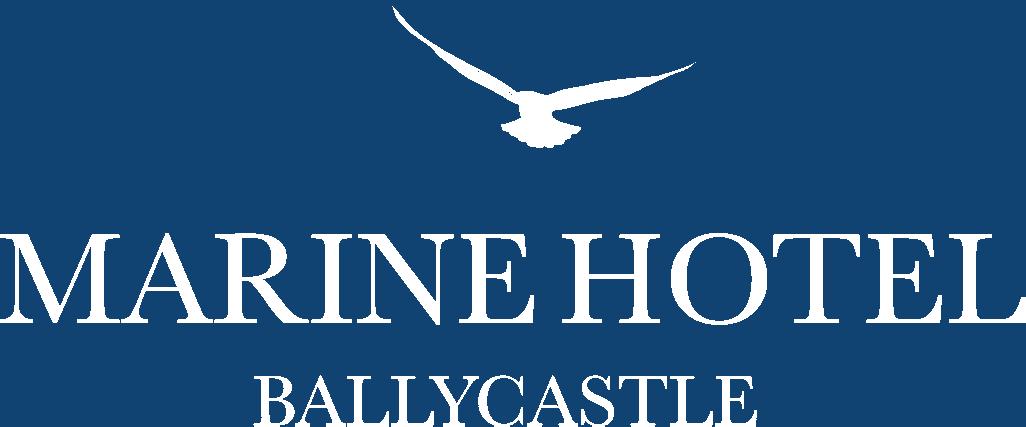
TEL 02820762222 MARINEHOTELBALLYCASTLE.COM Coastal Conferences ALL NEW CONFERENCE & EVENTS BROCHURE GET IN TOUCH BY EMAILING EVENTS@MARINEHOTELBALLYCASTLE.COM
FEATURE
Ulster Carpets Sets Out Sustainability Targets
Ulster Carpets has set a series of ambitious targets in its drive to become Net Zero.

54
Marking its 85th anniversary this year, the company is already the world’s premier supplier of Axminster and Wilton carpets to the world market. But protecting the planet remains of key importance, as outlined in its first Sustainability Report.


Nick Coburn, group managing director at Ulster Carpets, explained: “As a third-generation company, our ethos is built on family and community values. These were attributes that my grandfather instilled in Ulster Carpets when he established the company in Portadown in 1938.
“That same commitment is vital in protecting our planet and providing a long term, sustainable future for the generations that follow. We already have a proven track record as industry innovators and this report underpins our credentials as a sustainable company driving the change that our sector needs.”
55 FEATURE
The new report outlines five key targets to be met by 2025, including:

• 50% reduction in carbon emissions
• 18.5% reduction in energy intensity
• 5% reduction in water consumption

• 20% reduction in waste
• 5% reduction in packaging
Beverley Copeland, director of organisation development at Ulster Carpets, added: “While sustainability and efficiency has been an important part of our history, by setting these key targets we are outlining our firm commitment to the future.

“We have already made some significant developments to reduce our waste and cut our energy and water usage but, as a company and an industry, we know there is still a lot of important work to be done.
“We are determined to continue on this important journey towards Net Zero and to ensure that we can provide a more sustainable future that will last for another 85 years and beyond.”
www.ulstercarpets.com
56 FEATURE
Learn Grow Excel Training







OVER 192
DELEGATES TOOK PART IN THIS TRAINING ACADEMY IN THE LAST 18 MONTHS



90%
SAID TRAINING FULFILLED THEIR OBJECTIVES
96% 93%
FOUND NEW WAYS OF WORKING THROUGH THIS TRAINING
WOULD RECOMMEND THIS TRAINING
SME PARTNER
Academy
your challenge is boosting sales, digital marketing, personal communication, sustainability reporting or
your people, NI Chamber can help. Dynamic Presentation Skills SEP Mastering B2B Sales SEP LinkedIn and Video Content Training JUNE Managing in Times of Change MAY | OCT Sustainability Reporting APR | NOV Middle Management Training APR | NOV In-House Training BESPOKE Digital Marketing Through a Cost Cutting Lens OCT Book Now Visit www.northernirelandchamber.com Or contact Marta.Gajewska@northernirelandchamber.com to discuss your business needs.
Whether
developing

58 FEATURE
Sandra Wright, senior human resources business partner at NatWest Group.
The Feel Good Factor
Ulster Bank is driven by its purpose but what lies beneath a commitment to delivering on its strategy and how does this make a difference to customers and colleagues?

59 FEATURE
For Sandra Wright, senior human resources business partner at NatWest Group – Ulster Bank’s parent – it’s encouraging colleagues to become more engaged and fostering a greater spirit of collaboration within the organisation which right now is dialling up efforts to champion people and communities right across Northern Ireland.
Few know more about the importance of a meaningful CSR strategy than Sandra. A psychology graduate from QUB, Sandra joined Ulster Bank’s HR division in 2006 before taking up the NatWest position in 2015. And while the world of banking and how people interact with financial services has changed drastically throughout this time, how to motivate and get the best from people largely remains the same.
“It’s about tapping into causes those around you care about,” explains Sandra when asked about the importance of the many charitable partnerships Ulster Bank is involved with. “That’s how we’ve been able to deliver long-term benefits with each of our community programmes.”
One such initiative is One Week in June where colleagues from all divisions come together to raise money for a particular charity chosen by the bank’s employees. The latest campaign saw more than £80,000 raised for Macmillan Cancer Support which, at a time when many charities are experiencing difficulties with fundraising, has helped secure the provision of additional nurses and specialist equipment for cancer patients.
“Because Macmillan means so much to our colleagues, we’ve enjoyed a really strong partnership with them for a number of years. Most people will have seen either directly or indirectly the difference this charity can make so we’ve been fortunate that our teams have really got behind this fundraising drive and we’ve been blown away by the quirky and creative fundraising methods deployed over the years.”
While donating to a local cause is reason enough to continue with One Week in June, there’s also the wider benefit of colleagues engaging in a more meaningful way with the bank’s purpose, explains Sandra.
“Working together at a community event is like a big shot of enthusiasm for our colleagues and quite often those
who are volunteering get as much out of helping as those on the receiving end. For some time now, we have been able to chart through employment survey results that those who have spent time working on CSR activities are more likely to feel more positive and engage better with their work. So it’s an added bonus that we can bring this buzz back to the workplace as well.”
With hybrid working patterns now a permanent fixture across many organisations, does Sandra think employees are losing opportunities for enjoying the social side of work with faceto-face time now at a premium?
“It’s true that with more people working from home there are fewer opportunities to bring whole teams and divisions together But actually what we’ve found is that opportunities to engage with CSR activities are now seen as more attractive. Humans are social creatures after all and while technology does an amazing job in keeping us all connected, nothing can ever replace the craic and joy we have away from our desks working on a big community project.”
Other initiatives see colleagues using their skills and professional capabilities to make a difference to the next generation of employees.
“Growing and developing enterprise skills is another huge area of focus for us
right now which is why our partnership with The Prince’s Trust is such a special one. This is a group-wide project but a lot of the work takes place here in Northern Ireland and we have a strong team of volunteers making an impact locally.”
The crux of this work involves providing workshops on employability skills and carrying out school visits where pupils are offered a greater insight into the world of work and support with practical exercises such as CV writing and feedback sessions.
“Preparing young people for the world of work shouldn’t be the sole responsibility of education providers or family members. If we want to attract a talented workforce who are adequately prepared for the future, then we must play an active role in their journey.”
“But again, we also see an additional benefit where colleagues are given further opportunities to thrive, using skills they may have taken for granted, and generally being inspired and motivated in a way that only comes through working with young people.”
And speaking of working with young people, Ulster Bank has also extended its partnership with the Sunday Life Spirit of Northern Ireland awards and is keen to strengthen the reach of these community awards among young people here.
“It’s the feel-good factor for me,” explains Sandra. “Seeing ordinary people up on stage being recognised and applauded for their acts of generosity is just an amazing thing and it’s truly humbling to be in the presence of people who have overcome such adversity in their day to day lives yet still found the courage to help someone else in need.”
In Sandra’s view, the awards fully demonstrate Ulster Bank’s purpose and offer the perfect channel to support individuals and communities to thrive.
“That’s what it’s all about for us. We are proud of our heritage and association in Northern Ireland so it’s right that we give back and get involved at a grassroots level. We look for where the need is and are agile enough to pitch in and help.
“And when you reflect on all of the various causes and organisations we have been involved with over the years, you can see that a lot of good work has been achieved. I certainly feel proud to have been part of this effort and look forward to continuing well into the future.”
60 FEATURE
“Growing and developing enterprise skills is another huge area of focus for us right now which is why our partnership with The Prince’s Trust is such a special one. This is a group-wide project but a lot of the work takes place here in Northern Ireland and we have a strong team of volunteers making an impact locally.”
ONCE HOME TO THE WORLD’S BIGGEST THINKERS. STILL IS.

ENQUIRE NOW ABOUT EVENT AND VENUE HIRE AT TITANIC BELFAST


TITANICBELFAST.COM



Wilson Nesbitt Partner Wins Women in Business Award


The Outstanding Mentor award is an accolade to recognise mentors who have given generously of their time to support, guide, challenge and encourage their mentees to success, which Lenore has plenty of experience in delivering.
Lenore joined the firm in 1991 and leads the Individual and Family Life department, advising on divorce, financial settlements, trusts, wealth succession planning and high net worth asset protection.
Experience as mentor
Lenore’s first formal mentoring was undertaken through Women in Business having completed the Advance Coach certificate. Lenore also mentors through the Law Society of NI and QUB Women in Law.
Internally at Wilson Nesbitt, Lenore has been a master to trainee solicitors for nine years with special dispensation to facilitate two law firm trainees in the same year.
Lenore also assists business clients in mentoring. With her unparalleled commitment to the development of NI women in the workplace whether they are colleagues, counterparts at other firms or clients, mentoring is a natural extension of who she is as a market-leading private client lawyer.
What her mentees say

“Since I joined the firm 12 years ago I have benefited from Lenore’s invaluable knowledge. Lenore has always been helpful and approachable, welcoming new ideas. Lenore encouraged me to set goals and increase my knowledge, as well as progress my career.”
Ciara Barlow, Wilson Nesbitt.
“Lenore shows encouragement and support to new businesses, encouraging networking and promoting confidence. She is warm and open, sharing her own

62 FEATURE
Lenore Rice, partner at Wilson Nesbitt, has won the Outstanding Mentor Award at this year’s Women in Business Awards.
experiences to help others develop their profession and business.”
Jessica Melville, Insula Wellbeing.
“Lenore encouraged me to use professional networks to help build a successful business. She’s a great mentor in determining practical options on how to grow a business and identifying mutual contacts. She’s knowledgeable, with an excellent personable style, inspiring confidence to tackle business problems.”
Nicola Morrison, Eclectic Wellbeing.
Wellbeing and work-life balance
Lenore places great importance on wellbeing, leading her firm’s wellness week and continuing incentives since the Covid-19 pandemic.
Lenore pioneered legal wellbeing seminars for her clients’ teams: banks, insurance, tech companies and law firms. Lenore encourages mentees to consider their wellbeing and to develop greater self-awareness with work, social home life, health and finances.
“Lenore is ahead of her game in promoting balanced wellbeing and bringing initiatives to her workforce, ensuring they pay attention to work-life balance.”
Jessica Melville.
“Lenore recognises that having a successful career can be allconsuming, particularly as a female running a business. She’s a great advocate of the need to switch off, creating balance between personal and business life. She happily discusses her own challenges and issues, which has been inspiring to me. I view her as a role model, which has given me confidence, empowering me to believe in myself to achieve my objectives.”
Nicola Morrison.
“Lenore’s empathy and genuine interest in an employee’s personal life make her a mentor that you can confide in. Lenore has supported hybrid working and has been an active advocate for wellness in the workplace through various initiatives.”
Ciara Barlow.
The success that her mentees enjoy since their mentoring is testament to their own hard work and commitment, however, it’s clear from their feedback that Lenore has definitely played an integral part in encouraging them to strive for success.
Speaking about the award, Lenore said:
“I am so proud to have received the Women in Business NI award this year for Outstanding Mentor. The words of Tina McKenzie (CEO, Staffline Ireland) at the finalists lunch resonated with me when I eventually got home and kicked off my shoes: ‘it’s a pretty special deal’ and it’s certainly one I’ll cherish.

I quickly learned that the mentoring relationship is a reciprocal one. You invest your time in your mentees to help them expand their knowledge and skills, to help them to challenge themselves, to help them grow their professional networks and connect with leaders.
And what do I get in return? I believe I get to develop my leadership skills, to engage with younger women who can challenge traditions and share their experiences, and I get to improve my interpersonal communication skills. There is something truly awesome in seeing someone develop and to witness their successes.
Thanks to our fantastic Wilson Nesbitt team, our great clients and connections for all their continued support.”
63 FEATURE
“Lenore’s empathy and genuine interest in an employee’s personal life makes her a mentor that you can confide in. Lenore has supported hybrid working and has been an active advocate for wellness in the workplace through various initiatives.”
Partner Lenore Rice (centre) presented with the WIB Outstanding Mentor Award by Ellie Macbeth from sponsor Version 1 (left) and Nicola Robinson, Chair of WIB Board and Sourcing Director, Spirit AeroSystems (right).
Columnist
Co-Creating Value Through Partnership
For many years, learning and development has been an essential component in enabling organisations to attract, retain and recruit talent. However, in today’s disruptive business landscape, the growing relevance of development and support of your people is becoming clearer as business conditions shift and workforce roles change.

Over the next decade, skills and talent shortages are expected to increase considerably. In 2020, McKinsey & Company reported that 87% of companies are currently facing skills gaps or expect gaps to emerge in the next five years. Government figures published in the same year show that UK employers invested around £42bn in training annually, with an average spend of £1,530 per employee. The business services sector saw the largest increase in total training expenditure, increasing by 21% in 2019 (£11.4bn).
While the overall proportion and total investment in skills has been declining after a decade of low growth following recent economic uncertainty, employers continue to value skills as a critical component in boosting productivity and business growth.
Recent findings from the 2022 CBI education and skills survey shows most companies surveyed are planning to increase or maintain investment in training and development over the next 12 months.
Increasingly, strategic learning partnerships between education providers and industry are playing a vitally important role in helping businesses build specific skills and knowledge aligned to organisational needs. Learning partnerships can take many forms – from graduate recruitment, student placements, educational consultancy, knowledge
transfer and executive education.
When it comes to organisational development, every business’ learning needs are different, and one size does not always fit all. From embarking on a new growth agenda or driving business improvement, some organisations we work with at UUBS require tailored learning solutions that reflect the unique context of their organisation. In this case, learning and business impact can be maximised through customised executive programmes.
Through partnership and co-creation, tailor-made executive development programmes are designed to deliver real business impact at both an organisational and individual level. We work closely with businesses of all sizes and sectors to understand their unique challenges and strategic goals, co-designing and delivering learning solutions in line with the organisations’ individual requirements.
This joined-up approach to curriculum development ensures issues discussed in the classroom are highly relevant and practical to workplace challenges. Such programmes draw on the latest academic thinking and research to address specific business needs and have a unique blend of academic rigor, contemporary learning design, and practical application.
Given its proactive and flexible nature, UUBS’s programmes take many forms and focus on different disciplines and areas impacting modern businesses including digital transformation, leadership, sustainability, innovation and strategy - with businesses gaining value from the contextualisation of learning, authentic assessment and flexible delivery.
This creative approach has led to highly successful mutually beneficial partnerships with businesses such as
Axiom, Kainos, Deloitte, TextHelp, PwC and Hastings.
In a recent development, UUBS has partnered with digital transformation experts, Kainos, on a bespoke leadership development programme. The custombuilt programme has equipped Kainos with diverse leadership skills to support the acceleration in company expansion and growth.
Lee Collins, Head of Engagement, Culture and Development at Kainos commented:
“Our colleagues were involved from the start, and we designed the programme and modules to complement their personal learning and development. Ulster University’s Business School team challenged us to identify our business needs and gaps and matched those to best practice in global leadership development.”
More recently, UUBS has partnered with Derry~Londonderry-based Insurtech specialists, Alchemy Technology Services, to deliver a new customised training programme to develop the company’s next generation of emerging leaders. Academic experts from UUBS worked in partnership with Alchemy’s leadership team to design an accredited leadership development programme that focused on enhancing leadership capabilities, knowledge, and behaviours.
According to Alchemy Founder and CEO John Harkin: “leadership skills which equip us for the future are crucial to the success of our business and this bespoke programme allows our people to deep dive into real world business challenges as well as benefit from world class expertise in business and leadership. The team at Ulster University Business School has provided us with an excellent experience, both in understanding our business needs and supporting the growth of our team.”
64
Professor Gillian Armstrong Associate Dean – Development and Partnerships (Domestic), Ulster University Business School
















OUR EXPERTS HAVE WORN MANY HATS
Our experts are well-versed in businesses like yours, so they can help you nd the right solution, even in testing times. closebrothers.com
Columnist
Jane Shaw The Elmfield Institute
Dealing With Uncertainty At Work
A2022 American Psychological Association poll reported that 81% of Americans experienced stress from global uncertainty resulting from the pandemic. When our income, home, economic, and political future are insecure it can raise a lot of anxiety. The COVID pandemic caused a huge amount of uncertainty which we all had to deal with but when compounded by a lack of economic and political stability it can sometimes feel overwhelming.
We are hard-wired to scan for danger. Uncertainty is perceived as danger and so an unpredictable future can trigger the body’s stress response. Uncertainty affects our brain stem by telling us we are unsafe and thus need to take action – run away, stay and fight, or immobilise. We become either hyper- or hypo-vigilant. The stress response is a healthy reaction when appropriate in a short-term situation, however, continued over a long time it will have an adverse impact on our health. Long-term uncertainty therefore can cause both physical and mental health issues.
The not knowing is the most difficult part. Think of when you have waited for the results of an exam or a health test, or the confirmation of an important loan or a new sales contract. Often, once we have actually received the bad news it is easier to deal with. We can take appropriate action after we know the outcome. It is the continual knots in your stomach from not knowing that causes the damage.
Equally, it is hard to get excited about a piece of work if you think you might not have your job next month. Why put all the effort in if you don’t know where you will be? Uncertainty can cause a
lack of engagement. However, even if we cannot plan for an uncertain future, we can become more comfortable with the unknown. Being present to the current moment is the best way to do so, albeit a lifelong practice. In my therapy practice, often I strive to be okay with an unknown outcome. Moreover, uncertainty gives the opportunity for more possibilities for healing.
If our future is too predictable it can also hinder our creativity and productivity. The unknown can reach further into our imagination in a positive way. Too much certainty can feel limiting and restricting.
The important point is that we each have a different appetite for uncertainty depending on our life experience and resiliency. If we can listen to our individual response it will give us more choice over how to respond and what action to take to support ourselves. We can develop skills to respond to the uncertain situation in a helpful way.
Six tips to help mitigate uncertainty as both an employer and as an employee
Stay in communication
It is all too easy to make up stories in our head about the future. If we keep communicating with our boss/employee, it can help to relieve unnecessary fabricated negative outcomes. Open communication helps us to stay with the facts, rather than the potential fiction.
Ask for help from someone you trust
Asking for support is always a good idea.
If you are anxious about an uncertain situation it can help to tell someone you trust. Our neurophysiology responds positively to support.
Acceptance
This is an ancient Buddhist practice but one that is also transferable to today. The self-acceptance researcher Kristin Neff advises that finding ways to accept a situation and to move on has many health benefits.

Presence
Practising mindfulness supports us in uncertain situations. Those stories we make up about the future become minimised when we practise being in the present moment. Bringing awareness to your senses – taste, touch, smell, hearing, and sight – helps to ground you in the moment. It creates a bigger gap between the stimulus and response, giving us more choice over how to respond in any given moment.
Self-care
In stressful uncertain times at work, try to spend extra time looking after yourself. Sometimes it can be tempting to turn to food or alcohol to destress, however, this can often add to the stress response in the body. Additionally, sometimes we can overwork, when a more productive strategy could be to go for a head clearing walk. Be conscious of how you look after your own needs.
Don’t isolate yourself
Isolating behaviour can be easy to fall into when the future looks uncertain. If you think about it, it is 99% better to stay connecting with others around you. Share the load. Others may be feeling the same as you.
References
(2022). Stress in America 2022: Covid second anniversary. American Psychological Association.
66














INTERNATIONAL CHAMPIONS International Trade Training Courses Whether you are new to exporting, want to up-skill or learn more about how new trading arrangements impact your role and business operations, NI Chamber can help. Book Now Visit www.northernirelandchamber.com Or contact Marta.Gajewska@northernirelandchamber.com to discuss your business needs. Commodity Codes Export Documentation Series MAY | DEC MAR | DEC Incoterms JUN | SEPT Importing Unpacked MAY | NOV Accredited Trade Training Series APR & MAY | OCT & NOV Rules of Origin APR | JUN | OCT Exporting Unpacked MAY | NOV
Meet the Women Powering a Cleaner Energy Future




FEATURE 68
The theme of this year’s International Women’s Day was #EmbraceEquity. To mark the day, which took place on 8 March, Ambition sat down with some of the women leading the transformation of Northern Ireland’s energy system for a more sustainable future. All working at SONI, the organisation which manages the transmission system (better known as the “grid”), we spoke to them about why they chose careers in science, energy and engineering, and what more can be done to encourage more women to choose industries and disciplines where there is often an under-representation.
EMMA MORRIS IS SONI’S SYSTEM OPERATIONAL MANAGER.




“There’s no doubt that the energy sector is similar to other STEM industries in that there is clearly an underrepresentation of women at all levels but particularly in senior roles.

“In my own organisation at SONI and across the all-island energy system, we are seeing more and more women at a senior level which is hugely positive, but there’s more we can do in the future. But while there is a lot that individual organisations can do, I think the underrepresentation of women in STEM roles is a much wider societal issue, and something we need to address together in a broader sense.”
Thinking about the advice she would give to other women and girls about a career in science, engineering and energy, she said:
“The energy sector is an area in our lives which will change the world in the coming years. Not only is that a really exciting opportunity, but it’s so important that women, as half the population, are part of that change. So, just go for it. Don’t feel that being a woman limits you in any way, and don’t feel that you need to act or behave any differently – be confident, be you.
“It’s not always been easy for me but I know I’ve worked hard to get to where I am in my career.
Knowing that has given me the confidence in my own knowledge, skills and experience to contribute as a fully equal part of our team. It’s also given me the trust that my expertise and input will be respected by colleagues in my own organisation and elsewhere.”
Catriona Kelly, Rebecca Russell and Francesca McKee are Engineers in SONI’s Graduate Programme. They each studied science- and energy-related degrees at university.
“I got into engineering because I loved physics and maths in school and was always interested in learning how things work”, said Catriona.

69 FEATURE
L-R Catriona Kelly, Emma Morris, Alicia Trainor, Rebecca Russell, Francesca McKee.
For Francesca, it was an interest in the environment and her desire to play her part in tackling climate change.
“Growing up I always enjoyed breaking things to find out how they worked and functioned (but not always putting them back together). A career in STEM appealed to me because of the problemsolving – coming across a problem and working out an efficient solution was always very satisfying for me and a career in engineering allowed me to develop this skill,” added Rebecca.
When discussing their advice to other women thinking about their careers, the three graduates all agreed that more needed to be done to make science and engineering an appealing option to girls when they are at school.
“If you feel passionate, go for it! From primary school level, there should be more education about careers in engineering using female role models to show younger girls they can get there too!” insisted Francesca.
Rebecca added:
“My biggest advice is to realise that at some points you might be the only woman in a team but this is not a bad thing. Realise that you may have a unique point of view on the situation and that your different experiences may lead to a different solution to the problem. Don’t be afraid to voice your opinion or ask a question as everyone is continuously learning and developing.”
Alicia Trainor is a project manager at SONI. A graduate in environmental planning, Alicia is responsible for coordinating with colleagues across the organisation to
ensure the successful completion of SONI’s infrastructure projects.
“I always had an interest in the environment and social sciences so planning was a perfect choice for further study.”
Alicia highlighted SONI’s role in the fundamental link between environment and infrastructure as an important motivation for her. Like Francesca, Alicia felt a personal commitment to doing her bit to tackle climate change.
“Upgrading the existing electricity infrastructure with innovative
technologies while expanding the industry with new developments is vital for increasing the capacity for renewable energy generation and therefore reducing reliance on fossil fuels,” she added.

“I have always been passionate about the environment and while I try to do my best in my personal life to reduce by carbon footprint, I felt the best way to contribute to the global climate ambition was through a career in science and engineering with a focus on the energy sector. It’s very rewarding to see how the projects I manage contribute to the increase in renewable energy generation and through forward planning, I can clearly see the path to our net zero carbon future.”
Alicia highlighted the impact that a strong network of peers and role models can play in encouraging women to progress to senior levels in the sector.

“In my eight years in the industry, I have built up a strong network of peers who help me and I help them so building relationships with colleagues and like-minded individuals can be a strong tool in career progression. The more women we have in influential roles, the more role models there are for other women so encouraging colleagues to apply and strive for roles is a good way to encourage others.”
To mark International Women’s Day 2023, SONI hosted a series of internal workshops to provide opportunities for younger women in the organisation to engage with and learn from more senior female colleagues about their shared experiences and the importance of women progressing to more senior roles. For more information about SONI, visit: https://www.soni.ltd.uk/
70 FEATURE
“In my own organisation at SONI and across the allisland energy system, we are seeing more and more women at a senior level which is hugely positive.”
Tree-mendous Efficiency
Over £70m is set to be invested by development company Strand Homes as it continues its seven-year build programme at the multi award winning High Trees in Donaghadee, with funding supported by Bank of Ireland UK.
With 80 homes completed and occupied at High Trees, the Strand Homes team continue to grow their sustainable ambitions with a series of additional energy efficiency measures, including solar panels, a 5kW battery and an electric car charging point fitted in all recent homes.
Jennifer Mitchell of Strand Homes says, “Building sustainable homes with a community connection is the driving purpose behind Strand Homes and we are delighted to have the support of Bank of Ireland in delivering our vision at the High Trees site.
“We have worked closely with Bank of Ireland to facilitate the innovations and enhancements across our High Trees homes and we are delighted to have their continued support for our future plans.”
“For us it’s about more than house building, it’s about creating
a development that evolves as a community both in the development and across the local area.
“We’ve been achieving that in a number of different and unexpected ways including investing in an on-site plant nursery so we can grow our own plants on site. This secures the supply of the recommended plants in line with the All-Ireland Pollinator Plan which we were the first residential developer in Northern Ireland to join. We’ve had lots of residents and local school children come along for events at the nursery, aiming to establish a Community Garden which will be a great legacy in the development long after our works have finished.”
“At Strand Homes we genuinely want our customers to be the beneficiaries of what we are doing and this is in terms of the community aspect as well as the green initiatives. The feedback from the solar installation has been brilliant.
“We moved in on 6 May 2022 and the meter hasn’t moved. To date, we haven’t used any electricity from the grid and couldn’t be more delighted. Especially given today’s prices, we feel so fortunate
to have this included in our specifications. We even decided to upgrade from standard six panels offered by Strand Homes to 12. It’s been so efficient and cost effective.”
Ciaran Lavery, senior business manager at Bank of Ireland UK, says: “We are really pleased to support the Strand Homes team with the High Trees development, and very much support the company’s ambition to build sustainable homes, communities and connections.

“At Bank of Ireland we work closely with our customers to help them meet their ambitions and deliver further economic and social value. We look forward to working with the Strand Homes team as the High Trees site and their development programmes continue to grow.”
Based in Belfast, Strand Homes is focused on building homes with community connections where homeowners love where they live. The company, which began in 2011 has committed to the construction of over 300 homes at High Trees Donaghadee and 46 homes at Ferndene in East Belfast.
71
NEWS
L-R: Niall Devlin, head of business banking, Bank of Ireland UK; Ciaran Lavery, senior business manager, Bank of Ireland UK; Jonny Dobson, director, Strand Homes and Jennifer Mitchell, sales and marketing manager, Strand Homes.
FEATURE
Established 40 years ago, Orchardville NI is a leading provider of government funded projects in training and employment and community inclusion, supporting around 500 people with learning disabilities or autism to reach their full potential, grow in confidence and independence and, where possible, get and keep paid employment.
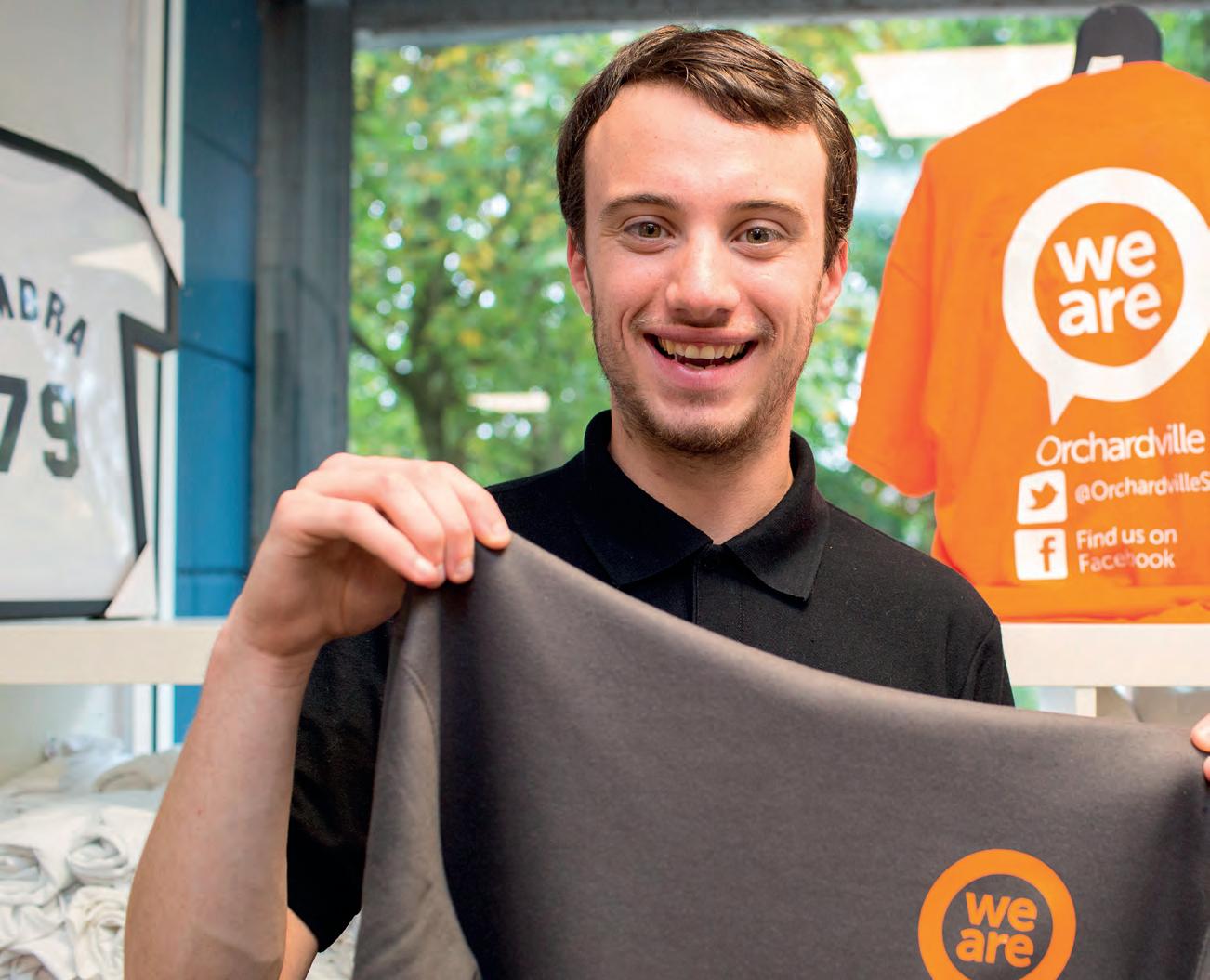
Orchardville NI Social Enterprises and Employer Partnerships 72
Proactively seeking out opportunities in the private and public sector, the charity works in partnership with employers across Northern Ireland, to identify their specific needs for roles within their organisation to provide effective solutions at a time when recruitment and retention of staff is expensive and challenging. With participants’ needs at the forefront of everything they do, Orchardville is successfully helping to alleviate the difficulties currently encountered in a variety of sectors including catering and hospitality, health and social care, warehousing and administration.
Joan McGinn, chief executive with the charity explains:
“This is more than just a box-ticking exercise for companies. Through tailoring jobs and matching suitable participants, we have shown how valuable our service users can be working alongside a business’ workforce fulfilling important roles, adding value and supporting employers to have an inclusive and
diverse workforce. We are currently partnering with around 100 organisations in the public and private sectors where we have successfully placed people in jobs that deliver benefits both for our participants and the employers, through our employment programme but also using our social enterprises, directly or as part of their supply chain.”
Social Enterprises
An example of this is Orchardville Cleans, a social enterprise that was established in December 2020 after spotting a gap in the commercial cleaning and sanitising market. Initially specialising in dry sanitisation, an in-demand service in a COVID world that enabled businesses to be deep cleaned without the need for downtime or loss of production, Orchardville worked with a range of partners including Belfast Health and Social Care Trust, to develop a base of returning customers due to the reliable, quality, flexible and value for money cleaning and sanitisation service being offered.
The aim was to develop a financially sustainable social enterprise while also providing employment opportunities for people with learning disability or autism.
Brenda McCracken, director of operations, comments: “One stellar example of how both participants and businesses can benefit is the project between Orchardville and Ryobi in Kilroot. After targeting major players in the commercial cleaning sector, Robinson Services introduced us to Ryobi Aluminium Casting, Carrickfergus in August 2021. The cleaning requirement was initially on a short-term, temporary basis with five of our participants with learning disability or autism and one supervisor providing a cost-effective solution to a longstanding industrial cleaning issue, delivering a quality service to a world-class standard as required by Ryobi.”
The relationship has developed further and, with a contract signed in July 2022, Orchardville Cleans now has two supervisor/forklift drivers and nine full and part-time participants engaged in numerous warehousing activities at the Kilroot site.
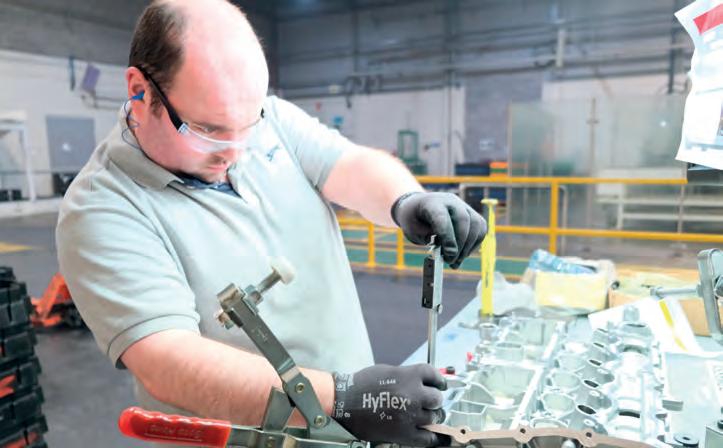
“Not only have our staff and participants been recognised by Ryobi as the perfect combination of reliability and dedication to warehouse and production roles,” says Brenda, “but one highly capable participant has been promoted to a Quality Control position, demonstrating that career progression is possible and that those furthest from the labour market are a top-quality service solution to any organisation.”
Gwyneth Evans, HR manager at Ryobi, reinforces this saying: “Working in partnership with Orchardville has been a seminal moment for Ryobi in employing those with learning disability or autism at our sites. We are delighted with the high quality, consistent service provided by the Orchardville Cleans team at our Kilroot warehouse for the past 18 months. I would encourage any NI organisation to explore this largely untapped resource.”
Other social enterprises operated by the charity include Orchardville Works which provides a range of print, hand finishing and mailing solutions and three Orchardville Cafés in locations across Belfast.
CONTACT JOAN MCGINN ON TEL: 028 9073 2326 OR VISIT WWW.ORCHARDVILLE.COM TO FIND OUT HOW WE CAN WORK WITH YOU TO DELIVER EMPLOYMENT OPPORTUNITIES AND PROVIDE QUALITY SOLUTIONS.

73
FEATURE
Elaine McGibbon, senior organisational effectiveness partner at Danske Bank.

Why Danske Bank is Embracing the Squiggly Careers Concept 74
We’ve known for a while that the concepts of a career ladder and jobs for life are largely a thing of the past. It’s often quoted that, on average, people change jobs every five years, but as new roles evolve and skills requirements change, that time frame is reducing.
It’s against this backdrop that the concept of Squiggly Careers was born. The term, first used by Sarah Ellis and Helen Tupper in 2020 in their book of the same name, challenges the old career progression model, arguing that success shouldn’t only be measured by getting a pay rise or a better job title. Instead, they highlighted that more people are pursuing “squiggly” careers, where progression is defined by the individual and may take different, more flexible paths.
Danske Bank has embraced this concept, seeing it as a way to offer new opportunities for its colleagues, identify untapped skills from within its workforce and encourage everyone to think more creatively about careers within the business.
The bank has partnered with
consultancy AmazingIf and organisations like the London Business School, Specsavers and the British Red Cross to research the best ways to encourage people to “squiggle” and explore the opportunities open to them.
Elaine McGibbon, senior organisational effectiveness partner at Danske Bank explains: “As an organisation we’re always thinking about the future and that includes the shift in views of what a career looks like. Instead of the traditional corporate career ladder where people are predominately focused on the next grade up, we’re encouraging career squiggles. “As individuals, to enjoy our work we have to identify what motivates us most and what gives us energy. To find our niche we have to try new things – squiggling helps us do that,” she adds.
“New technology and innovations mean that people constantly need to learn new skills and operate with a growth mindset, so it’s about broadening people’s perceptions of what their possibilities are and promoting lifelong learning, which in turn helps future-proof our organisation. “Career squiggling doesn’t just mean moving role, it could be taking part in a project team to extend their network, being mentored or becoming a mentor, joining a committee or affinity group to gain new skills, volunteering, going on secondment or even stepping back to broaden their skillset in preparation for a future role. Only thinking about the next step up may limit your opportunities to extend your skillset and try new possibilities.”
Elaine cites the bank’s technology and digital development unit, which didn’t exist five years ago, as an example of where it is creating opportunities for people to develop new skills and work with others from different backgrounds and specialisms to gain digital qualifications and build their networks internally and externally.

“How we work is changing so we need to do things differently,” says Elaine. “We’re finding more and more that people are increasingly attracted to purposeful work and organisations that align with their own values. They want to know about our culture and what we stand for as an organisation. We all spend so much time at work it’s only natural that we want to be happy in what we do, feel that we belong and that the work we do makes a difference.”
Danske Bank was recently named the top company to work for in Northern
Ireland and the top financial services employer in the UK in the Best Companies league tables for the first quarter of 2023. The Bank ranks as the eighth best large company to work for in the UK, across all sectors. These awards recognise excellence in employee engagement.
“One of the factors which Best Companies assess is personal growth, which recognises the focus we put on helping our colleagues to build their skills, knowledge and experience, finding out what they enjoy and creating the opportunity to explore with genuine support,” says Elaine.
“It is about uncovering people’s potential. One of the concepts of squiggly careers is borrowed brilliance and we’ve been doing that over many years with people moving into projects and sharing expertise,” she adds.
The focus on squiggly careers within the workforce has also informed how Danske Bank now approaches recruitment, with the focus very much on transferable skills.
“We are asking what the key skill requirements are for a role so we can make them as accessible as possible, to encourage rather than inhibit applications,” says Elaine.
“We’re finding in recent recruitment rounds that people who wouldn’t traditionally come into a banking role are applying and being successful. For example, applicants from the hospitality industry bring lots of experience with customers, communication and problem solving; all important skills for us.”
Line managers encourage their team members to consider different growth opportunities, but Danske Bank also asks colleagues to own their development and be proactive in setting up conversations with managers and mentors to discuss how they can reach their potential.
“Many people have applied for roles and been successful based on those career conversations. It is very powerful to have that encouragement to try different things,” says Elaine.
“We know that when people find their niche they will thrive and ultimately be successful. That may not always be a step up the ladder. Some people are happy to continue to grow in their current role or team, others want to keep exploring new possibilities while others want to progress to the next grade. What’s sometimes forgotten is that roles are constantly changing. The jobs that existed five years ago aren’t the same now. That means the ladder is not a straight ladder anymore.”
75
Developing the Next Generation of Entrepreneurs and Employees
Young Enterprise has for over 30 years been Northern Ireland’s leading enterprise, entrepreneurship and financial education charity, inspiring hundreds of thousands of young people to forge lasting careers in business.
This work has always been underpinned by business volunteers who donate their time and expertise to give young people insight into the real world of work. In the post-pandemic era, the charity has found a growing concern for the work readiness of young people in Northern Ireland.
The charity’s chief executive, Carol Fitzsimons MBE, explains:
“Most of the young people coming through the education system today have had their time in school disrupted, meaning many are expressing anxieties about entering the workforce. We know that learning from people in the world of work is highly valued, and Young Enterprise provides a hands-on solution to address this issue.
“At Young Enterprise, our school and community-based entrepreneurship programmes give young people the skills they need to make an effective transition into work or entrepreneurship under the guidance of our business volunteers. They bring real-world experience into the classroom. That has a profound impact on our young people.”
Roger Kennedy is director of Aiken Kennedy Financial Planning (AKFP), and a long-standing volunteer with Young Enterprise.
“I have been involved with Young Enterprise since 2015, mentoring student companies on the Company Programme. AKFP become a Business Backer in 2018 also, which means we donate a small amount of money to the charity each year too. In addition, in 2023 we have launched an incentive to help raise money for this great cause, making a £50 donation for every initial meeting we have that comes from a client recommendation.

“The Company Programme allows groups of students to start their own business, so I have had the privilege of mentoring companies on that journey through the school year. The amazing
thing is that I get to guide them through the ups and downs of business and support them but, ultimately, they make all the business decisions.
“Personally, I get so much from it in terms of giving back to my community and the schools close to home in Lisburn. The companies I have mentored have all had a common thread of excitement, energy, and enthusiasm. I find that when I return to the office after meeting with them, that energy just carries through the rest of the day.”
Emma Wilson heads up recruitment at broadband provider Fibrus and is an alumna of the Young Enterprise Company Programme from her school days.
“As a relatively new business in Northern Ireland we were looking at developing our corporate social responsibility activities, and Young Enterprise was a perfect fit for us. Firstly, I had experience with Young Enterprise as a student, so I was a big advocate for their work, having taken part in the Company programme over 20 years ago. So, we knew the impact we could have would be great, but also, we wanted to get involved in something that would benefit us as a business and the communities we provide broadband services to.
“For our team to be able to get hands-on with the development of young people in those communities was a major reason why we became involved. It also allows our people the chance to develop their own skills and confidence in areas such as presentation and speaking skills, communication and team work outside of their usual working environment.
“We have teams who work on everything from broadband infrastructure, customer service, business support roles, sales and many more. Volunteering with Young Enterprise allows us to talk about the range of roles available in our industry and inform the career choices of young people in the years to come. Ultimately,
76 FEATURE
they will become the future leaders of our industry, so to be able to connect with them at this stage is a real benefit to Fibrus.”
Catriona McGirr is community engagement manager at Bank of Ireland UK.
“Bank of Ireland UK has been a proud supporter of Young Enterprise since 2013, working together to help provide young people and students with skills, knowledge and confidence around money and how they can successfully manage their finances.

“With Young Enterprise, we can get into the classroom, helping children at primary school ages to learn about money, basic living needs and decision making to help them form good money habits early in life that can take them forward as they grow. We find when those saving and budgeting habits
are formed early that young people are much more financially literate in later life.
“Our people are actively involved with the partnership and give their time alongside the Young Enterprise team in the classroom bringing the real world of money and financial literacy first hand in a really practical way.”
“Our partnership with Young Enterprise is one of a number of ways in which we work to help improve financial literacy and wellbeing throughout the communities we serve, helping to break down any stigma associated with talking about finances and supporting people to be confident in manging their money, plan for the future and be as prepared as possible for the unexpected.”
To get involved with Young Enterprise contact jan@yeni. co.uk or visit yeni.co.uk for more information.
77 FEATURE
NEWAPPOINTMENTS
IN THE BUSINESS







 COMMUNITY
BILL LAZENBATT Project Architect at Hamilton Architects
MATTHEW STOCKTON Business Development Manager at The Old Inn
ANNA MCKELVEY Head of Marketing at Belfast City Airport
JONATHAN WILLIAMSON Chief Operating Officer at EY Northern Ireland
JESSICA HARRIS Tax Trainee at Baker Tilly Mooney Moore
LISA DOHERTY Head of People and Purpose at Belfast City Airport
CHRIS PLATT
Commercial Director at Re-Gen Robotics
COMMUNITY
BILL LAZENBATT Project Architect at Hamilton Architects
MATTHEW STOCKTON Business Development Manager at The Old Inn
ANNA MCKELVEY Head of Marketing at Belfast City Airport
JONATHAN WILLIAMSON Chief Operating Officer at EY Northern Ireland
JESSICA HARRIS Tax Trainee at Baker Tilly Mooney Moore
LISA DOHERTY Head of People and Purpose at Belfast City Airport
CHRIS PLATT
Commercial Director at Re-Gen Robotics
78 APPOINTMENTS
NEIL ARMSTRONG Tax Director at Baker Tilly Mooney Moore
Morrow Communications Appoints Two New Directors To Bolster Growth Plans
Leading integrated communications consultancy, Morrow Communications, has announced the appointment of two new directors to bolster the company’s growth plans. The two new directors are Nicola McClean, who has been with the company for over 15 years having started as a graduate, and Clare Daly, who joined almost 9 years ago from a global communications agency. As well as contributing to the strategic direction of the company, they will continue to lead a number of integrated communications accounts for clients at the firm.
Based in Holywood, Morrow Communications currently offers a wide range of strategic communications support including public relations, digital marketing, event management, video production, advertising and graphic design services to a large number of organisations in the public, private and third sectors across the island of Ireland and the UK.
Celebrating 38 years in business this year, the company has ambitions to grow its team to 40 by the end of 2023 making it one of the largest independent communications consultancies on the island of Ireland.

Speaking about the new appointments and growth plans, Managing Director, Peter Morrow said:
“As a company we have always enthusiastically embraced change and been able to adapt to new market challenges and opportunities. Blessed with a talented team of people, we are very proud to appoint two new directors from within our ranks who will now play a key role in helping us seize such new opportunities. Both Nicola and Clare are consummate comms professionals, and we have no doubt that they will now bring a lot of energy, fresh thinking, and commitment to their new board positions.”
Grant Thornton Welcomes New Graduate Intake
Business advisory firm Grant Thornton has welcomed 22 new graduates to its Belfast office.
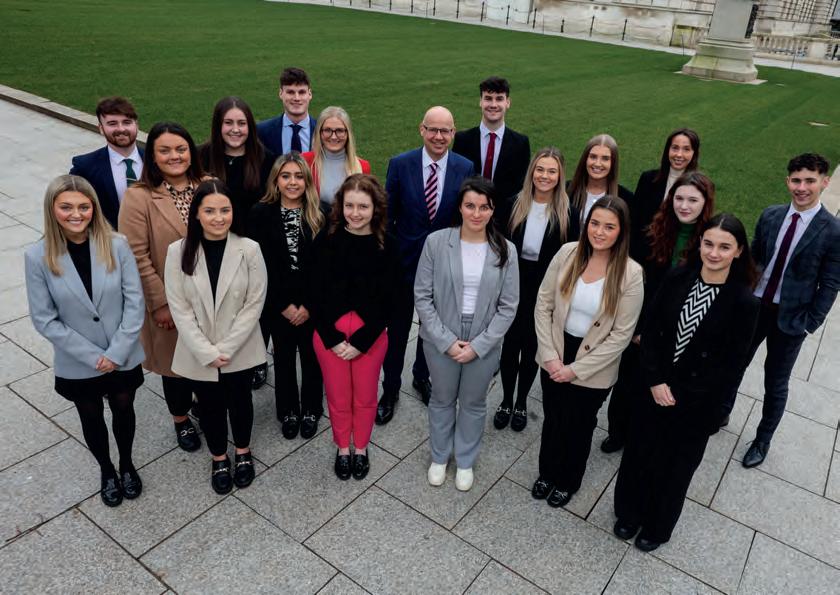
It is the latest expansion for the firm and follows further increased demand across its market leading audit, tax and advisory departments.

 Grant Thornton Northern Ireland Managing Partner Richard Gillan
Grant Thornton Northern Ireland Managing Partner Richard Gillan
said:
“It is great to welcome a fresh intake of talented graduates to Grant Thornton as they embark on their career paths. I have no doubt that our latest appointees will further enhance our reputation as a firm which ‘thinks outside the box’ to provide exceptional service and advice to our clients.”
The graduates have joined Grant Thornton’s three-year training programme, designed to provide the skills and experience necessary to gain the required industry qualifications and play their part within a dynamic, global firm.
The firm has continued to expand its Belfast office significantly in recent months as part of its post-pandemic strategy for exponential growth. Last year, it announced the recruitment of more than 50 new staff across all departments, while just last month, it unveiled the appointments of seven new directors.
79 APPOINTMENTS
Grant Thornton Northern Ireland Managing Partner Richard Gillan, centre, welcomes the latest intake of 22 new graduates.
Pictured are the two new directors at Morrow Communications, Clare Daly and Nicola McClean.
Risk Control in a Hard Market








Today’s hard insurance market, for certain sectors, means bigger premiums and less coverage. It takes a broker and risk management specialists with big leverage to navigate it properly. Northern Ireland Managing Director for Gallagher Shane Matthews talks to Emma Deighan. 80 FEATURE
Gallagher insurance broker and risk management specialist has a history in Belfast that dates back almost 70 years with thirdgeneration family members still at the fore of its operations.
But being part of a century-old international business for almost 10 years – since the original firm was acquired by US-headquartered Gallagher – is what gives it both small-town family appeal and international brawn in what Shane believes allows it to offer the best solutions to businesses here.
“It’s practically impossible for the small broker now to provide the breadth of service that a business needs because you need leverage with the insurers, but you also need expertise,” Shane Matthews begins.
“At Gallagher, we have over 40 people we can talk to who are specialists in cybersecurity alone. That is just one area of our business and a small broker can’t offer that.”
With specialisms including social housing, manufacturing, technology, construction, not-for-profit, financial and professional services and property sectors, Gallagher has been serving businesses and individuals here under various names brought about by a series of mergers and acquisitions throughout its history.
“We are part of Gallagher, the third biggest broker in the world, with 46,000 staff. The business is listed on the NY Stock Exchange but what is great for our clients is that we remain family run which brings a family culture, but equally we have leverage that being on a national and international scale gives us.
“We get good deals for clients but at our heart, we’re family-run. We’re the right balance,” Shane says.
The firm’s Alfred Street office was first established in 1957 originally trading as Bartholomew and James. The business expanded over the years through natural growth, merger and acquisition before being purchased by Gallagher in 2014.
Some of its newest and biggest local clients include sector names in shipbuilding, tourism and professional sports clubs as well as government organisations.
And they’re high-profile names with huge assets and futures.
“We’ve won those accounts based on a mix of things,” Shane continues. “Our methodology is strong: when we’re looking at a client, it’s not just about the premium they pay it’s about what risks face that business, then we put in place a risk
management and insurance programme tailored to their needs.
“A business faces a lot of risks but it’s about managing that and asking what risks the company retains itself and what it transfers to the insurance market.
“We look at what we offer as more of an advisory relationship and because of our scale, we’re afforded those competitive rates. We also have the best people and the best resources to tap into here in Belfast and further afield.”
Explaining the landscape of the insurance and risk management market at present, Shane continues: “Every sector is facing challenges right now, with some distressed more than others.
“For example, if you look at the motor sector, insurance premiums have more than doubled there and the coverage they can get is much less because of claims pressure. That means there are fewer insurance companies actively wanting to take on business which reduces supply. Our role is challenging and requires us to navigate towards solutions around that more restricted market.”
Shane says court awards for long-term injuries are higher in Northern Ireland than elsewhere in the UK which has created havoc for firms with large public liability for risk of injury including those in the manufacturing sphere.
But there are solutions to all problems he asserts.
“A lot of the principles of what we do apply to most trades. The broad advice is, you have to look at risk in and around the total cost of risk, not just the insurance premium because that’s just a small fraction of how you reduce risk. It’s about things that could undermine the balance sheet. A lot of people carry cover for low-range items which is insuring risk that won’t put them out of business. We advise not fussing with low-level stuff and instead looking at what’s a catastrophic risk. We think about what cover you can carry yourself, we don’t need to insure everything under the sun, it’s about prioritising.”
Shane anticipates a levelling of the hard market and indeed industry predictions would indicate a slowing of premium cost growth in 2023.
“Historically the market is cyclical and when premiums go up, insurance companies make better returns and that attracts fresh capital which then creates fresh competition and lower premiums. We do expect the market to get a little easier but it will be 2024 before it happens.
“If you look at the decade 1980 to 1990, the world didn’t change as quickly, but the pace of change is so fast nowadays and it’s difficult to know whether that traditional model will necessarily follow through into the future,” he says.
Looking at Gallagher’s business model, he predicts further growth.
“I’ve been working in Belfast 40 years this year and since then there have been quite a few mergers and acquisitions. When I started there may have been 20 brokers, similar in scale. There would’ve been a lot to choose from but now, with those mergers and acquisitions there are only four or five big players, and there’s a real drop in scale in the market. Arguably there is less choice, but all of us face the same challenge, the biggest of which is the attraction and retention of talent.
“We have a young team coming through and that will help us,” Shane adds.
That team will double in size too “over the next five to ten years”.
“We think locally and globally it will double and that will be through the acquisition of smaller businesses along with organic growth.
“There are tough times in the market and changing circumstances but that also creates more opportunities for us. We’re regularly talking to companies about possible acquisition and to good people who work with other brokers.”
81 FEATURE
“Our methodology is strong: when we’re looking at a client, it’s not just about the premium they pay it’s about what risks face that business, then we put in place a risk management and insurance programme tailored to their needs.”
Columnist
Jeremy Fitch Executive Director for Business Growth in Invest Northern Ireland
Is Innovation Essential For Business Success?
In May 2021, the Department for the Economy published its 10X Economic Vision which clearly identified innovation as the driver of delivering a ten times better economy which would benefit everyone.
Jeremy, who has been a long-time champion of the power of innovation, research and development, says he was heartened to see this ambition front and centre of the Department’s vision, adding to his determination to integrate innovation into all aspects of business in Northern Ireland.

Over the past 20 years, since its creation, Invest NI has helped thousands of businesses develop innovative products and services. Reflecting on his time with Invest NI, Jeremy says: “Many, many local companies have received support through our innovation, research and development initiatives to research, design, develop, prototype, test and commercialise their ideas, with many going on to successfully compete on a global stage; we have a lot to be proud of.”
However, Jeremy continues: “Innovation is much wider than many think. It is more than technology and science, and it is not just about creating new products and services. I believe that businesses are now beyond these boundaries and that they think about process innovation and innovation processes!”
It is for this reason that Invest NI, working collaboratively with the Department for the Economy, has formed Innovate NI – an initiative that helps businesses of every shape and size to innovate successfully through education, mentoring and recognition.
Innovation processes
“Successful innovation is the result of a managed process, and Innovate NI can help local businesses through that process,” says Jeremy.
“They have adopted an easy-to-follow four-step Innovation Framework which provides a guide for a business to follow:
there are videos explaining each of the steps and clear action points and tasks for each stage of the innovation journey.
Jeremy continues: “Too many businesses try to run before they can walk and end up failing to identify and commercialise good ideas. It is important to complete each step of the framework in the right order, undertaking thorough ideation and selection tasks first –otherwise we can spend vital funds on developing and testing non-viable projects.
“The beauty of Innovate NI is that it is available to everyone – sole traders, micro-businesses, SMEs and large corporate organisations. Businesses can access the Innovation Framework online, and if they submit an innovation assessment it will be assessed by our innovation advisors. Businesses will receive expert advice and mentoring to help them complete the next set of tasks, progressing along the framework to commercialisation and implementation.
To make sure existing and potential staff, investors and customers understand the commitment the company has made to innovation, Innovate NI will issue them with a recognition certificate to verify their advancement along the framework. We want businesses to have an increased desire to become more and more innovative and to be able to see the progress they are making.
Those who have submitted assessments and been recognised by Innovate NI also benefit from expert mentoring and tutoring. In February this year, 30 businesses which were in the process of the ideation and selection stages (bronze level innovators) or the development and testing stage (silver level innovators) attended a one-day workshop where they received expert advice and training to advance their ideas. Our aim is that by supporting businesses through a managed structured process, they will move only the most viable business ideas
through to commercialisation effectively, efficiently and quickly.
Process innovation
Despite the common perception, innovation goes further than using technology to create new products and services, in fact, it has been proven repeatedly that innovating business processes can create significant value.
Innovate NI strongly supports this view, recognising process and organisational innovation as tools businesses can use to remain current and competitive. Innovate NI recently recognised Kukoon Rugs as a platinum level innovator, based on their successful process innovation. The Newry based company used the Innovation Framework to help solve a logistical issue which was affecting their ability to win business in certain markets. They followed the Innovation Framework, completely innovating their approach to warehousing and shipping, and as a result gained a significant competitive advantage.
Signposting
Innovate NI can also signpost businesses to the most appropriate support for their needs from the entire innovation ecosystem. For example, if they believe a business needs help to develop and test their idea, they may recommend applying for an innovation voucher. However, if the innovation is in its very early stages they may put you in contact with a local council or college which has the right support to help you analyse which of your ideas is the most viable. The Innovate NI team promotes innovation, provides a framework, educates and mentors and works with the multiple organisations locally and nationally – it really is a one-stop-shop for innovation in Northern Ireland.
To find out more and to submit your own innovation assessment, visit: www. innovateni.com
82












In association with BUSINESS CLASS MOTORING Supplement MOTORING. Leasing for Everyone 028 9038 6600 agnewleasing.com
WITH JAMES STINSON
For those not ready to make the leap to fully electric cars, hybrids are the way to go. Using a combination of petrol and electric power, hybrids deliver better economy than traditional petrol-only cars and are usually much cheaper than plug-in electric vehicles.

They’re a good bit more flexible too – not having to put up with the hassle of wondering whether there’s enough juice in the battery to take you on a long-distance journey or if that public charger you planned on using is available and working.
So, while some manufacturers have gone hell for leather down the electric route, many car makers have taken a more cautious path –mating petrol engines they’ve spent decades honing with the best electric technology around.

The latest Honda Civic e:HEV shows what can be achieved. It uses a 2.0 litre petrol engine along with a lithium-ion battery and two electric motors, which combined produce 181bhp.

What’s clever about this setup is that the petrol motor is used primarily to generate electricity for the electric motors that power the wheels. At low speeds and for short distances in and around town, it will happily pootle about in electric only (EV) mode and when driving conditions dictate, it will veer back into hybrid mode. Only at higher speeds does the engine intervene to power the wheels directly.
It's all quite complicated but, thankfully, it’s not something the driver has to worry about. All you have to do is select what style of driving you prefer – eco, normal or sport – and the car does the rest. It moves seamlessly between different drive modes, hybrid or otherwise, without fuss or fanfare.
Civic Leader


The result of this clever gadgetry is claimed mpg of around 60 mpg, which is quite an achievement for a petrol-powered car of this size, and it’ll go even higher if most of your driving is in and around town. Performance is brisk too, with 0-62 mph coming up in around 8 seconds.
It’s an enticing package, which is handy because for the time being at least, it’s the only type of powertrain available on the Civic. Elsewhere, there’s a lot to commend the latest Civic. The body shape is a lot cleaner, less angular than the previous model. It’s slightly bigger, with acres of glass, which makes for a bright, airy cabin with excellent visibility.
The cabin interior is reassuringly upmarket, with lots of soft touch materials to the fore. Honda has also tidied up the dash in this latest model, with most of the controls coming easily to hand and they’ve kept conventional knobs for the aircon rather than bury them in the touchscreen, which is a blessing.
On the road, the ride is pliant while the steering is precise and responsive. All of this is aided by a relatively low seating position which adds to the sporty feeling. Eager drivers meanwhile will be thrilled by the turbocharged 324bhp Type-R version, which has just gone on sale.

While pricey, the Civic does come well equipped. Currently available in either Sport or Advance trim, standard features include climate control, adaptive cruise control, heated front seats, privacy glass, automatic lights, part-leather seats, 18-inch alloys, wireless phonecharging and rear air vents.
Range-topping Advance cars add a heated steering wheel, synthetic leather upholstery, an upgraded audio system and a panoramic glass roof.
Every Civic comes with a very impressive list of safety equipment, including 11 airbags, automatic emergency braking, lane keeping assistance, traffic sign recognition and blind spot monitoring. Prices start from £33,720.
Latest Civic is a happy marriage of electric and petrol technology, writes James Stinson.
84 James Stinson LIFESTYLE ANY MAKE, ANY MODEL Leasing for Everyone 028 9038 6600 agnewleasing.com 13766.001 PRESS - Advertising v3 strips.indd 2 02/03/2022 16:38











THE POWER OF CHOICE THE CHOICE OF POWER ELECTRIFY YOUR FLEET WITH OUR EV CONSULTANCY SERVICE. Whether you are planning to electrify some of or all your eet, Agnew Leasing have the tools and experience to help you nd EVs that suit your business. 028 9038 6600 agnewleasing.com Leasing for Everyone
Final Edition To Mark 25 Years of Audi’s TT
Audi has revealed the last ever version of the Audi TT, which will end production later this year after 25 years on sale.
On sale from March, priced from £41,910, the TT Final Edition is available as a coupé or roadster and also offered to customers as a high-performance TTS.

The TT was first introduced to the world at the 1995 Frankfurt Motor Show as the Audi TT prototype study. It wasn’t until three years later that the iconic silhouette of the show car made the transition into production with only minor cosmetic alterations.
Designed to sit towards the top of the TT’s specification range, the Final Edition features plenty of exclusive design touches and enhanced levels of standard equipment.
The Final Edition is marked out by the black styling pack with black Audi rings and badging, black door mirrors, black tailpipes and a fixed rear spoiler also finished in black.
Roadster models also benefit from rollover bars and wind diffuser finished in black.
Privacy glass (coupé only) and red brake callipers housed behind 20-inch 5-spoke, Y-style, matt grey, diamond-cut alloy wheels complete the exterior upgrade.
TTS Final Editions ride on Audi Sport
7-spoke rotor, anthracite black alloys with gloss turned finish. Buyers have the choice between tango red, glacier white and chronos grey metallic paint as standard. Inside, the armrests in the doors, door pull handles and trim on the centre console are all finished in leather as part of the extended leather pack. An Alcantara steering wheel with red stitching and 12 o’clock marker is unique to the Final Edition, along with the Tango red inserts on the seats, air vents and centre console (coupé only). Further
enhancements include Alcantara-trimmed seats with decorative red stitching and red piping on the floor mats.
The UK remains one of the largest markets for the TT. In 2022, a total of 2,672 UK sales represented over 33% of global sales volumes for the model.

“Few models have lasted the test of time as well as the Audi TT,” said Andrew Doyle, director, Audi UK. “The crisp, Bauhausinspired lines of the sports coupé look as fresh today as they did back in 1998 and to mark the model’s incredible success here in the UK our Final Edition combines everything our customers love about this iconic model.”
Iconic Trim Added To New Electric Megane
Renault has enhanced the all new Megane E-Tech 100% electric with the introduction of the new top-of-the-range Iconic trim, which includes a heat pump for increased efficiency.


A unique benefit of the patented heat pump developed by Renault engineers is that the system recovers heat generated by the battery and the electric motor twice as efficiently to ensure optimal temperature for the cabin, while minimising the impact on range.
Renault says that when temperatures drop below 10°C, the heat pump can increase range by up to 9% on motorways over Megane versions without the feature.

The Iconic specification also features more choice of colour than the launch edition. Customers can choose from the two-tone paint options, picking their favourite paint colour on the body and choosing between diamond black or shadow grey on the roof. The body colour options range across solid, metallic, or special metallic paints: glacier
white, diamond black, shadow grey, ceramic grey and midnight blue. It also benefits from such standard and unique features as 20inch Enos alloy wheels and a gold F1 blade, a 9-speaker Harman Kardon audio system, smart rear-view mirror, and Around View 3D camera system.
The all new Megane E-Tech 100% electric is the first of a new generation of electric vehicles built on Renault’s advanced CMF-EV platform.
With an electric driving range of up to 280 miles, the new Megane E-Tech 100% electric also features a class-leading digital experience with a 12.3-inch dashboard display, 9-inch multimedia display, and Android Automotive OS with integrated Google services from the Techno trim. As well as the new Iconic, customers can choose from Equilibre and Techno versions, with the all new Megane E-Tech 100% electric priced from £36,995.
86 James Stinson LIFESTYLE
ANY MAKE, ANY MODEL Leasing for Everyone 028 9038 6600 agnewleasing.com 13766.001 PRESS - Advertising v3 strips.indd 2 02/03/2022 16:38




THE COURTYARD CARRICKFERGUS Elizabeth Sands BEAUTY SCHOOL Elizabeth Sands BEAUTY SCHOOL Elizabeth Sands BEAUTY SCHOOL Category Sponsors VOTING NOW OPEN Ulster Tatler Title Sponsor The Dining Room, Ulster Reform Club, 12.30pm Saturday 27 May Who has inspired you? To vote go to ulstertatler.com Voting closes 12th April 2023 www.ulstertatler.com If you are interested in attending contact Geraldine Waddell on 028 9066 3311 or email gerry.waddell@ulstertatler.com. Tickets are £65 per person (including Prosecco drinks reception, lunch and goodie bag).
BT Group Completes Multimillion Pound Revamp of Belfast HQ
The flagship building will host around 2,000 colleagues as the company reaffirms its commitment to Northern Ireland.
BT Group has reaffirmed its commitment to Belfast, and Northern Ireland, as it officially reopened its Riverside Tower building at Lanyon Place, in the heart of the city, following a multimillion pound refurbishment.
As a key location in the company’s future plans, the significant refurbishment has created a fantastic, modern workplace, which will now be home to around 2,000 colleagues from BT Group, which includes EE, BT Business and Openreach.

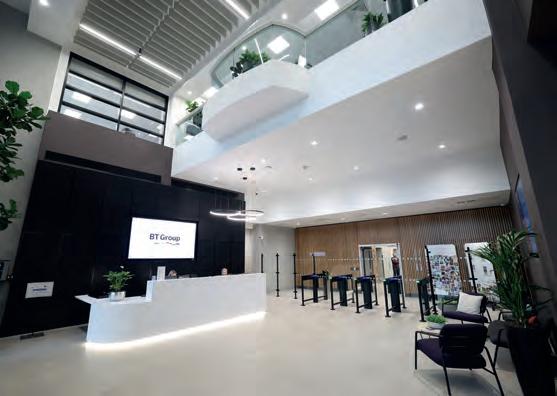
Belfast was named as a significant long-term location for BT Group in 2021 as part of the company’s ‘Better Workplace Programme’ – the largest workplace improvement and consolidation scheme of its type ever undertaken in the UK. The five-year programme, which will be complete next year, is seeing BT rationalise hundreds of its offices across the UK and establish an estate of modern workspaces.
The new building boasts state of the art technology and flexible work and collaboration areas. These shared workplaces are central to the company’s future, providing environments for colleagues to come together to collaborate, learn, develop and share their experiences. BT Group believes that inspiring office environments, combined
with a flexible approach to home working, will play a vital role in its future and in the future local economies of its key hub locations.
Commenting on the official opening, the Secretary of State for Northern Ireland, Rt Hon Chris Heaton-Harris MP, said: “This is great news, with BT Group’s significant investment in its Belfast base showing just what an attractive place for business Northern Ireland is.
“BT’s fantastic new office will provide a boost for the local economy, creating jobs and increasing footfall in the city centre, with staff spoilt for choice when it comes to options for lunch.”
Brent Mathews, BT Group’s property and facilities services director, added: “We’re really excited for colleagues moving into Riverside Tower following our multi-million pound investment in our Belfast flagship office. We want to bring our people together in an impressive and modern environment, transforming the way our teams work. This refurbishment represents a change in BT Group, one that is better for colleagues, customers and shareholders: easier to work with and for.
“We really want our colleagues to be proud of where they work and to feel part of something brilliant, inspiring them to also continue to do the best that they can for our customers.
“This investment also marks a significant commitment in Belfast. As a major employer in the city, our presence
will support local economic growth and employment opportunities. We recently announced plans to recruit 100 people into digital roles, such as Artificial Intelligence, software engineering and product management, as well as graduates and apprentice roles.”
The Lord Mayor of Belfast, Councillor Christina Black, added: “It is fantastic to see BT Group complete this multimillion pound refurbishment and that employees can now move into a new modern building in the heart of the city.
“This really is a big vote of confidence that a company the size of BT Group is continuing to invest in Belfast and is supporting its economic growth.”
BT Group plays an important role in Northern Ireland and is responsible for directly generating £1 in every £110 produced here, according to an independent report. BT Group employs approximately 7,300 people both directly and indirectly here.
The business is making record investments in next generation networks, such as full-fibre broadband via Openreach and 5G via its mobile network EE. This once in a generation upgrade to Northern Ireland’s digital infrastructure will support the region’s economic growth ambitions and ensure Northern Ireland’s businesses and public sector organisations are able to take full advantage of the latest technologies and digital possibilities.
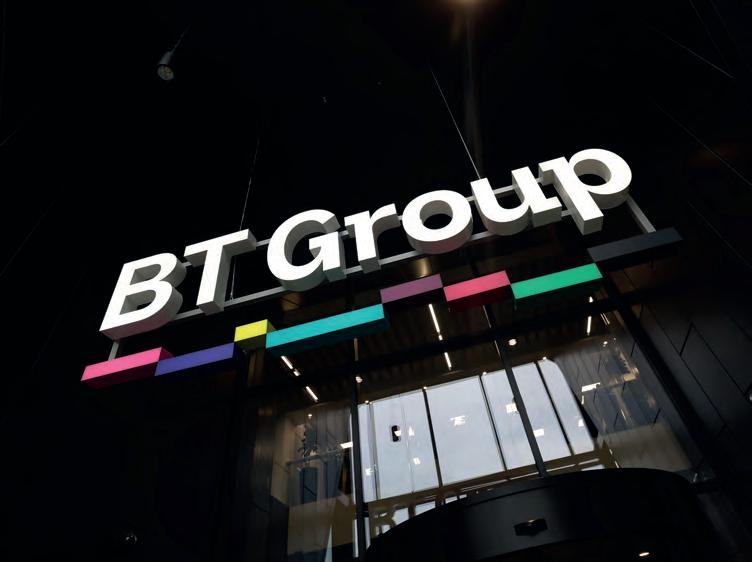
NEWS 88
THE COMPLETE TITANIC EXPERIENCE
DIVERSITY AND INCLUSIONSOMETHING WE MUST DELIVER ON
Titanic Belfast’s recent reopening means visitors can now enjoy the Reimagined Titanic Experience, shedding new light on Titanic’s story and showcasing real artefacts from the ship and its passengers. From £189 per room, stay across the cobblestones at Titanic Hotel Belfast and receive two complimentary tickets to the Titanic Belfast visitor attraction. You’ll also sit down to a Titanic sized breakfast, with free parking included for stays during the month of March 2023. Bring your little ones along too with the family package starting from £268 per room, based on two adults and two children sharing.
To book The Complete Titanic Experience visit: www.titanichotelbelfast.com, call +44 (0)28 9508 2000, email reservations@titanichotelbelfast.com

Award-winning global engineering, technology and consulting service provider, Expleo employs over 200 staff in NI and in 2023, with the help of Diversity Mark, they intend to double this creating a further 100 jobs in their Belfast office.
Hannah McAteer, Human Resource Business Partner at Expleo explains;

“Our global network of customers, suppliers and stakeholders are diverse, and we believe that the workforce that delivers our products and services should reflect that customer base.
We have now signed with Diversity Mark to support our strategy and to help us not only understand and connect better with our employees on a more meaningful level but also to provide us with an accountability partner.”
For more information visit www.diversity-mark-ni.co.uk
EV CONSULTANCY – ELECTRIFYING YOUR FLEET
For many fleet managers and businesses, the thought is how rather than when to transition their internal combustion engine fleet to an electric vehicle fleet. There are many reasons to convert to EVs, most notably saving money, decreasing your carbon footprint, and attracting and retaining employees. Whether you are planning to electrify some of or all your fleet, Agnew Leasing have the tools and experience to help you find EVs that suit your business and create a model that shows accurate Whole Life Costs to support your business in managing this process and helping to achieve your sustainability objectives.

Some key factors to consider are;
• While EV’s may have increased monthly costs they can have significantly lower whole life costs when corporation tax offset and Class 1A NIC savings are accounted for.
• Clearly Driver Benefit in Kind (BIK) costs are significantly lower with EV’s so including these can be a recruitment, retention, and reward tool for your business.
• New model EV battery ranges are improving meaning they may now become more suitable for your fleet compared to previous models.
• How your employees are reimbursed for business mileage can have a significant impact on your true costs.
• Offering a properly costed EV car scheme can be more cost effective for both company and employee compared to a cash allowance solution in some cases.
• Introducing EVs can assist with your company’s overall carbon reduction and sustainability agenda.
For more information on how Agnew Leasing can help your business please contact David McEwen our Head of Business Development on 028 9038 6600 or email david.mcewen@agnews.co.uk
89
Columnist
Courtney McKay Sync NI

The Software Alliance Launches as the Voice of Northern Ireland’s £1.7 billion Software Industry
engineering industry employs an estimated 23,000 people across 2,200 companies in Northern Ireland and contributes an estimated £1.7 billion to the economy each year.
The group seeks to identify and address the problems the industry faces, including labour shortages and skills issues. As a result of increasing demands for jobs, local estimates have shown that in 2021, there were 7,700 vacancies in the sector in Northern Ireland.
through which software engineering companies large and small can collectively set the strategic direction for the industry going forward. From a group of six independent companies engineering software right across NI, we have developed into an organisation that represents thousands in the industry and brings companies together to work collectively on the matters that impact us all to ensure a sustainable and prosperous economic future for Northern Ireland.”
The Software Alliance has today launched as the industry-led, representative voice of the £1.7 billion software industry in Northern Ireland.

Established in 2022 by a group of independent companies in the industry, the alliance held an official launch event at The Merchant Hotel, Belfast where it set out its mission to over 110 representatives from industry, government and education.

Founding members of the alliance include Allstate NI, Civica NI, GCD Technologies, Instil Software, Liberty IT and Kainos. As a whole, the software
Investment in Cyber Security
The UK Government has announced £18.9 million investment in NI’s Cybersecurity industry, including £11 million government funding through the New Deal for Northern Ireland, to develop a pipeline of cybersecurity professionals in NI as well as helping businesses and startups develop new opportunities.
The investment, announced by Minister of State for Northern Ireland Steve Baker MP, will see the creation of a new Cyber-AI Hub at the Centre for Secure Information Technologies (CSIT) in Belfast, creating jobs and supporting the research and development of AI-enabled cybersecurity projects.
The funding will help ensure a pipeline of world-class cyber professionals, with the creation of a doctoral training programme and masters bursaries helping to deliver
The Software Alliance launch event was addressed by Head of the Northern Ireland Civil Service Jayne Brady and CBI Northern Ireland Director Angela McGowan, who set out the strength of potential in the sector and need for a collective voice going forward.
In its formative year, the Software Alliance has grown to represent a range of local software companies that employ over 5,500 people, from microbusinesses to large companies, and represents approximately 25% of the total software workforce in Northern Ireland.
Chairperson of the Software Alliance
John Healy OBE said:
“We exist to be the central vehicle
Speaking at the launch of the Software Alliance, Jayne Brady, head of the Northern Ireland Civil Service, said:
“We have a vibrant and expanding software industry, and we should be proud that Northern Ireland is a leading region for innovative software businesses. This is an industry that provides solutions right across the public and private sectors, with ICT contributing an estimated £1.7 billion to the economy each year. I am thrilled, therefore, to see industry players come together to establish this collaborative forum and have no doubt the Software Alliance will contribute to the success and endurance of Northern Ireland’s wider technology sector.”
on the Government’s pledge of 5000 cyber professionals in NI by 2030, as well as supporting the Government’s £2.6bn National Cyber Strategy.
Speaking at the event, Minister of State for Northern Ireland Steve Baker said: “This funding will help to create jobs and strengthen Northern Ireland’s economy, ensuring NI continues to lead the way in cybersecurity.
“We have world-class talent and expertise in NI, and the Government is committed to developing cybersecurity professionals, here and across the UK. The funding will have an immediate positive impact on NI’s cyber sector, and with Belfast hosting the UK’s leading cybersecurity conference in April, I’m looking forward to seeing NI’s deserved recognition as a global cybersecurity hub.”
Department for Science, Innovation and Technology Minister Paul Scully, said:
“Northern Ireland’s cybersecurity firms play a huge role in the UK’s thriving and world-leading tech industry. We’re investing millions so people across Northern Ireland can gain the skills for exciting careers helping people and businesses defend against cyber threats.”
90

Dermatology Aesthetics Plastic Surgery Laser Vascular Skin Therapy Rheumatology Nutritional Therapy allskinstore.com
“Fantastic service from the minute I walked through the door! Every member of staff from reception to nurses to the consultant treated me with kindness and respect. I believe this is by far the best experience I have had regarding my health.”
028 9066 7077 info@belfastskinclinic.com @belfastskinclinic www.belfastskinclinic.com
Patient Review
Spring Has Sprung

Woman Editor,

Harkness, looks at the fresh and vibrant colours that we can bring into our wardrobe for spring 2023.



Harkness LIFESTYLE
Joanne
92
Ulster Tatler
Joanne
Coralie Dress by Gaala.
Daisy bangle, by Basak Baykal Jewellery.
Printed Hama Showerproof jacket, £189, Barbour.





 Coloured oversized wayfarer, £15, Accessorize.
Cloudia lime diamante shoes, £135, Dune London.
Vintage stripe rugby shirt, £69, Crew Clothing Company.
Halkirk Crew and slim jeans, £55 & £59, FatFace.
Paddie Paper Wave Slouch Tote, £59.50, Oliver Bonas.
Coloured oversized wayfarer, £15, Accessorize.
Cloudia lime diamante shoes, £135, Dune London.
Vintage stripe rugby shirt, £69, Crew Clothing Company.
Halkirk Crew and slim jeans, £55 & £59, FatFace.
Paddie Paper Wave Slouch Tote, £59.50, Oliver Bonas.
93
Liz suede belted jacket and trouser, Whistles.
Prawn & Crab Linguine

Serves 4
INGREDIENTS
400g Raw Tiger Prawns
200g Good White Crab Meat
100g Sliced Spring Onions
100g Shallots Finely Sliced
METHOD






1. Heat a pot over the stove and add the vegetable oil
2. When hot, add shallots, garlic, chili and prawns
3. Cook until the prawns take a little colour (approx. 3min), do not over cook
4. Remove prawns from pot, add wine and stock, reduce liquid by half
5. Add double cream and reduce liquid by half
6. Add spring onions, butter and prawns back into the pot
7. Add linguine, season and heat
8. Divide mixture evenly between 4 large pasta bowls
9. Divide crab between 4 bowls
10. Garnish with chopped parsley
30ml Vegetable Oil

3 Cloves Garlic Chopped
1 Large Red Chili Chopped Finely
1 Glass White Wine

200ml Fish Stock
300ml Double Cream
400g Cooked Linguine

50g Chopped Parsley
50g Salted Butter
Salt and Pepper
Gavin Murphy
Executive Head Chef
THEOLDINN.COM





































VOTING NOW OPEN TO VOTE GO TO WWW.ULSTERTATLER.COM THURSDAY 14TH SEPTEMBER 2023 CITY HALL, BELFAST AWARDS 16th THE CLOSING DATE FOR NOMINATIONS IS MIDNIGHT ON SUNDAY 25TH JUNE 2023. THE COURTYARD CARRICKFERGUS EVENT PARTNERS SPONSORS
Columnist
John Campbell BBC NI’s Economic & Business Editor
Is Brexit Finally Done?
Is that it then? Is Brexit finally done?
In one sense the answer is: “Yes, the UK and EU now have agreements which will allow for a settled relationship and mature cooperation.”
The other answer is: “Brexit will never really be done, particularly in Northern Ireland.” That second answer reflects the fact that the UK will have a dynamic relationship with the EU which will need constant attention. And the continuing application of the EU’s rules for goods in Northern Ireland means that relationship matters most in this part of the UK.
Among the immediate things that remain to be done is the implementation of the new Windsor Framework. That will require action by some businesses.
By now most people will have grasped the concept at the heart of the deal: red lanes and green lanes. GB goods which are staying in Northern Ireland will use the green lane at the ports, meaning they will not have to be checked and will require minimal paperwork. Goods which are due to travel into the Republic will use the red lane, meaning full customs documentation and checks at the ports.
Underpinning this will be data sharing and new trusted trader schemes. The overarching trusted trader scheme will be the UK Internal Market Scheme. Businesses already using the existing UK Trader Scheme (UKTS) will be automatically moved onto this. Traders who are not part of UKTS will need to apply – the government is promising a ‘once and done’ registration.
The most novel part of this scheme is the intention that traders won’t have to use commodity codes on every movement of goods. At the point of applying to the scheme traders could list the goods they normally handle. Based on these descriptions the UK authorities will help
in providing the appropriate commodity code for each of the goods. Then in future the goods could be declared without having to list the commodity codes. Instead the UK authorities (presumably the Trader Support Service) will translate the goods description into commodity codes.
The movement of food products – or more precisely retail groceries – is covered by a second scheme: the Northern Ireland Retail Movements Scheme (NIRMS). Again, those on the existing STAMNI scheme will be automatically moved across while the newly eligible will need to register, which is also promised to be a simple process.
The intention is to have the NIRMS operating by the autumn of this year. The trade-off for the NIRMS is the introduction of ‘Not for EU’ food labelling on GB goods, which is due to be phasedin from October.
The first products to be labelled will be meat and minimally processed dairy products like fresh milk and cream. More products will be added up until July 2025 by which point all relevant products should carry the label. The government is promising financial support to help with this changeover but at the time of writing it is not clear how much or who will get it.
Parcel operators will also have to make an adjustment to their operations. There will be no customs declarations for business-to-consumer parcels but assurance for the EU comes in the form of data sharing. That means the parcel operators will have to regularly send HMRC what the government calls ‘standard commercial that they hold as a matter of routine’.

This change has also been targeted for introduction in the autumn. The hope
will be that, unlike the experience of 2020, the government will have proper engagement with businesses in GB so they are ready to implement these changes. The point of all this being that this is not ‘done’ until an operational plan is added to the framework.
Then there is the longer term issue of how local business can bring influence to rules which are not being set in Stormont or Westminster. The ‘Stormont Brake’ should act as an incentive to the EU to consult carefully on measures which impact Northern Ireland.
The framework also includes what the EU calls ‘enhanced measures to deepen engagement with people and businesses in Northern Ireland’.
These include an annual event where the European Commission, the body which proposes new EU regulations will meet Northern Ireland stakeholders to go through the Commission work programme for the following year. On request, this can be followed up with information sessions or workshops on new initiatives of particular relevance. This all sounds useful but there is also the question of how to stay visible and engaged outside those formal structures.
The long standing Executive office in Brussels is already playing a role. But we might also consider what Scotland does. There is a Scottish government presence in Brussels but there is also Scotland Europa, a membership organisation which brings together business organisations, universities and armslength public bodies. Might we need a Northern Ireland Europa?
96
THE LAST WORD
Tailored to suit the homeowners’requirements, each Grant heating package is correctly sized and specified, free of charge, to achieve compliance, maximise efficiencies and provide long-term savings.


Packages feature the Grant Aerona3 air to water, air source heat pump, Grant hot water cylinders, Grant Afinia aluminium radiators and the Grant Uflex underfloor heating system. Smart controls are also available.
Trust Grant on the journey to warmth and comfort by sending house plans to heatpump@grantni.com






Our complete integrated heating packages provide everything needed to build a highly efficient, warm and comfortable home.
Take off time
with Platinum Services Private Terminal










With Dublin Airport Platinum Services, you’ll get VIP treatment from the get-go: an effortless private check-in and security, personal luxury suites and chauffeur driven to your flight on your departure, and a fast-track immigration service on your arrival. This service is available to all Dublin Airport passengers.
Book now on dublinairport.com




MAGAZINE OF NORTHERN IRELAND CHAMBER OF COMMERCE AND INDUSTRY MARCH/APRIL 2023



































































































































 Elvena Graham OBE, Past President
Elvena Graham OBE, Past President



 Francis Martin, CBE Past President
Francis Martin, CBE Past President



























































































































































































































































































































































 COMMUNITY
BILL LAZENBATT Project Architect at Hamilton Architects
MATTHEW STOCKTON Business Development Manager at The Old Inn
ANNA MCKELVEY Head of Marketing at Belfast City Airport
JONATHAN WILLIAMSON Chief Operating Officer at EY Northern Ireland
JESSICA HARRIS Tax Trainee at Baker Tilly Mooney Moore
LISA DOHERTY Head of People and Purpose at Belfast City Airport
CHRIS PLATT
Commercial Director at Re-Gen Robotics
COMMUNITY
BILL LAZENBATT Project Architect at Hamilton Architects
MATTHEW STOCKTON Business Development Manager at The Old Inn
ANNA MCKELVEY Head of Marketing at Belfast City Airport
JONATHAN WILLIAMSON Chief Operating Officer at EY Northern Ireland
JESSICA HARRIS Tax Trainee at Baker Tilly Mooney Moore
LISA DOHERTY Head of People and Purpose at Belfast City Airport
CHRIS PLATT
Commercial Director at Re-Gen Robotics



 Grant Thornton Northern Ireland Managing Partner Richard Gillan
Grant Thornton Northern Ireland Managing Partner Richard Gillan































































 Coloured oversized wayfarer, £15, Accessorize.
Cloudia lime diamante shoes, £135, Dune London.
Vintage stripe rugby shirt, £69, Crew Clothing Company.
Halkirk Crew and slim jeans, £55 & £59, FatFace.
Paddie Paper Wave Slouch Tote, £59.50, Oliver Bonas.
Coloured oversized wayfarer, £15, Accessorize.
Cloudia lime diamante shoes, £135, Dune London.
Vintage stripe rugby shirt, £69, Crew Clothing Company.
Halkirk Crew and slim jeans, £55 & £59, FatFace.
Paddie Paper Wave Slouch Tote, £59.50, Oliver Bonas.

































































